#the aging tumblr population strikes again
Explore tagged Tumblr posts
Text
Hahaha it's so fun having a body!
While I was still coming down from a migraine that started Sunday I was having... chest pains? Last night? In the beginning it felt kind of like when your underwire is poking you or the band of the bra is too tight. Except dialed up and the dial kept turning. And then it spread. And then i was suddenly writhing on my floor in pain, covered in sweat �� and considering that I had to unlock my bedroom door in case someone had to come get me in the morning 🙂
And when I was googling symptoms (pre-floor) the two most accurate were heart attack and muscle spasms and since it couldn't be a heart attack because my arm wasn't numb I just. Assumed the other thing.
Anyway this morning it was fine - then it started again. then I remembered that heart attacks have different symptoms in women and when I had made my mind up to take a shower and go see my doctor it stopped. So that's fun.
#the aging tumblr population strikes again#anyway the pain is gone but i'm still gonna go to the doctor#if nothing else i can ask for migraine medication and a corona refresher#flowers talks#cw medical#idk
9 notes
·
View notes
Text
Pov: you have a moderate upset tummy, but you do not know why.
10 notes
·
View notes
Text
last day i have to put up wit train strikes and waking up so so early to get here on time and for the waiting times between. so im reading romac in between. on phone so no funny business. stopped at bench and men
anyway
dont ever ask a woman her age a man his salary and vitaly how the geography of romac looks like
eureka was apparently partially new york but i know bc of worldwide photo shoots they later use places like paris on the bg so thats funny. i guess whale arc (is the whale stuff still there?) multiple alien and monster and annet chases and various flying machines could get you there, if the world map is still about the same
i guess im pointing it out bc i saw someone make a weird map connecting. idfk or even remember but the atlantic ocean wasnt there anymore
"He could only communicate with me via a copyrighted form of speech available to the Unconnectable population- talking loudly."
thats not copyrighted to unconnectables thats copyrighted to portuguese* come ooooon man
everything in this world needs a fookin loicense god what a nightmare

🤨
sorry i just dont buy this. first of all from having read the original comic before second of all because hes just some guy in both versions (who just happened to work for g-dir, best of the worst type deal) and third of related to the second of, it all feels like they pushed a role on him he didnt even knew existed and it all went downhill from there.
if he really was one of the catalysts of the apocalypse though rather than just being caught up in the aftermath (alongside PILOT!!!!) and omitting all that in previous POV logs for the unreliable narrator trope, then sorry tumblr sexy man that never was. i cant defend you here. you looked at yourself, said 'i can make her better' and then made her worse
number 2 also i just noticed. "infi"? miss ai generated number 8 pendant that ruined one of my favorite sequences in the original comic with 'is this a set ALMOST MISSED MY TRAIN STOP I THOUGHT WE WERE AT TUE ONE BEFORE
""Are you, really?" Infi raised an eyebrow. "Even that bench you're sitting on is charging you infractions. If enough tickets pile up, the Dexes will come and take you away. You know what they do to big debitors, Sven. You know what they turn people into. I'm sure you won't like wearing a smile on your face forever.""
ok so. if i recall correctly people in too much debt get killed and turned into dexes and idk if all dexes do the same job but in pilots case he became a debt collector or something. aka kill more people to create more dexes
and in most panels of him pre apoc without the pilot gear he didnt seem too thrilled about anything, facial expression wise. what im getting to is, it could be something added in the rewrite but it would be interesting if part of his character design had a smile stapled on whether he likes it or not.
well for what its worth hes happy now, only vaguely aware of his past
anyway- svens gone but the seagull lived? i dont think this bench would know if its the same seagull. also how are you talking to it? the bench lost whatever little mind it had djhgsjfj and this is positive character development
The User flickered peculiarly and suspiciously in my time-worn sensors, just like... Infi did.
AI girlie nonsense aside i guess shes's intriguing me a bit. if anything she's the true unconnectable leader and scapegoated snippy. but also youre still not baiting me with the "is captain infi???" rewrites. i know how to count. (<- gonna look foolish if this later happens anyway. "am i that out of touch? no. its the author thats wrong") (speaking of counting haha very funny that sven and steven, names sounding like seven, meet infi, represented by an 8/infinite, and some undisclosed time later the somewhat sentient bench they were on meet captain (also known as seven). basic homestuckology
these side little detours into the world that was are fun i think. but again, most (all? honest to god i dont remember anyone named infi being a part of anything going on) of this was already in the original so ya
#*was gonna say piigs for inclusion and insult reclaiment but ehh sensitive topic still ig#sugar.txt#reading romac
0 notes
Text
Gravity Falls - “Waiting”
Pop-Pop AU
Stan sits in a hospital waiting room, thinking about his life and the people he loves.
- - - -
This is kinda old, but I realized I never posted it on tumblr. Hope ya like it!
Lots of fluff, the only ships are Soos and Melody.
AO3 LINK
- - - -
It had a square aspect ratio. Ink pen and watercolor on white heat pressed cotton paper in a bland white frame. One single blue flower in a red vase with what looks like a yellowish shadow. One shadow going left, the other going right. The lack of confidence and inexperience was obvious, the lines were unfocused and jagged, the color plainly filled the shapes and gave no other visual interest to the image.
Below the frame was a small white card that read “Painting donated by Jessica Blaise from Gravity Falls Elementary School”
Stan scanned the painting at least 20 times while sitting in that chair. The too rough and too soft at the same time chair that had similar copies populating the almost white room he sat in. The wallpaper bouncing off light pinks and blues with tiny ducklings as a makeshift wainscoting was starting to irritate the old man. It was too bright, and the consistent buzz of the fluorescent lights seemed so loud. Stan adjusted himself in his chair, switching his crossed legs to a wider spread and leaned his head against the wall.
The only other stimulus in the room were a few posters promoting proper hand washing techniques, the play area with a small table and chairs with large blocks, crayons and that weird “game” with the metal wiring and wooden beads that’s in every waiting room Stan’s ever sat in. He played with the toys to give himself something to do after he read all the magazines. The novelty wore off fast.
The television mounted on the wall was airing some cooking channel with no sound and no subtitles. Looking at food when you haven’t eaten in a few hours was practically torture, so Stan had been averting his eyes.
There were other paintings on the wall, one was less of a painting, but instead a print of a painting. He doubted that the artist got any compensation from it, if they were still alive. The other was a charcoal drawing done by a student from the community college a town away. Another square, but the entire image was black, the brightest thing on the page was an intruding infant hand coming from the left with the arm fading into the dark background. The fingers seemingly mid-twitch and grabbing at something. The lighting was dynamic and interesting. Stan swore it was a drawing of a penis the first time he glanced at it, which resulted in his brother’s laughter. Stanley smiled at the memory, it was only a few hours ago, but he relishes any time he can make Stanford laugh.
Stan’s eyes darted at the door in the far corner when it opened suddenly. He eased back into his chair when the nurse crossed the room to talk with the receptionist. He couldn’t hear the conversation very well, but could tell they were just gossiping and making jokes. Nothing that was of his interest. So he looked back to the elementary school child’s painting and analyzed it again. His eyes were dry and he was tired. He wished he could sleep, the chair wasn’t comfortable enough and when he did managed to sleep, his neck was sore when he woke up. He was only lucky Ford let him use his shoulder as a pillow for a while. He looked to his left and noted the book his brother placed in the seat. It seemed thick and in what looked like Hebrew. Stan wasn’t very surprised Ford was fluent in the language they were acquainted with as children. Their grandparents on their father’s side were the last to be fully fluent in Hebrew. It was like his brother to be curious of their heritage, but Stan only remembered a few phrases and words he learned from holidays and special event when he had to recite anything in Temple.
Stan crossed his arms and glanced at the clock on the wall and let out an exasperated sigh. It had only been 10 minutes since he last checked the time. He wanted to be at home, be in his soft warm bed and getting ready to eat pancakes at this time in the morning.
He and Ford were on the porch of The Mystery Shack when Soos rushed them off to the hospital the yesterday afternoon. What he originally thought would be a couple of hours of waiting turned into almost twelve. Apparently labour can last a long time.
Stan wished he could be a witness for Soos and Melody like he was when Dipper and Mabel were born, but Melody wanted her privacy, which Stan could respect, but Soos wanted him there…..so he and Ford waited in this bright, annoyingly pastel waiting room, twiddling his thumbs awaiting the arrival of the new member of the mystery family. He was glad he was in at least comfortable clothes, some gray sweatpants and a sweater Mabel knitted for him that read “godfather”.
He was never clear on what the title entailed, but it was mentioned a few times by Soos’ grandmother and the kids insisted that Soos was intending to ask him. He hadn’t, but he didn’t protest Stan wearing the sweater. Whatever job godfathers had, he was willing to play the part if Soos were to ask him.
Stan looked at the double doors a few feet away that lead out of the waiting room and into the halls. His brother left to find something for them to eat, but was taking his sweet time. The turkey being basted on the television was no help in aiding his growling stomach.
He distracted himself by returning his thoughts to Soos and Melody. Just down the hall they were experiencing the strange and beautiful phenomenon that was witnessing the arrival of a brand new person. Stan remembered the feeling so clearly. His entire life he’s felt the presence of human beings. It’s inherent in most people to feel when someone is in the room with you, the other soul sharing the same space as you. Imagine being in a room with a set amount of people and someone else comes in, but imagine they came in without using a doorway. Just appearing seemingly out of thin air. Suddenly another person is with you, and they’re brand new to the world, a life full of potential and power. Yes, today is indeed a happy day, but no amount of positive thinking would ease Stan’s nerves. His foot began to bounce and his hands unconsciously began to fiddle with each other. He didn’t want to think anything would go wrong with Soos’ baby, but anything can happen and life is so fragile, especially at the start of it.
He recalled his nephew’s nervousness the day Dipper and Mabel were born. His hands were shaking and he was constantly checking on his wife and asking the doctors loads of questions. He didn’t fully understand the twins’ father’s behavior until the end of that day.
Mabel’s birth was swift and easy. Her mother only needed to push one and a half times before she was here. It was as if she was eager to meet everyone waiting for her. She cried like most babies do, but Stan could’ve sworn they were tears of joy. While Mabel was greeted with, “hello, beautiful”, “hi, sweetie” and “she’s perfect”, Her brother’s introduction to world started with, “what’s wrong?”, “wait, let me hold him”, and “he’s not moving”. Dipper was rushed out of the room before his mother got a chance to look at him. Stan managed to catch a glimpse of the horrifyingly blue tint on his great nephew’s tiny face. The memory still gave him chills. He remembered how much he wanted to hold Mabel, who began to fuss and cry, obviously missing her brother. He was terrified at the prospect of another incomplete set of twins in their family. After the longest 30 minute of his life, Stan’s great-nephew returned with a bright pink face, wailing with all the power his little lungs could produce. Once the twins were reunited in their mother’s arms, they settled down almost instantly. The doctors told their parents Dipper was significantly lighter in weight than his sister, but both were very strong and healthy. Every so often Stan thinks about Dipper and how much he has impacted his life. His thoughts lead to darker places and he questions if Ford would be here if Dipper wasn’t there to find the third journal. He shook his head as a cold shiver went up his spine.
Stan did his best to distract himself from revisiting the scare that Dipper caused him 16 years ago.
16 years…..17 in August
Stan blinked. The squishy, bright faces that stayed with him that first summer had changed significantly. They stayed in contact all year round and visited every summer since they were 12. But every in-person meeting was always a shock. Dipper was developing the square jaw Stan, both his brothers and nephew shared. He started to regularly wear glasses their second summer with the Stans. Poor kid will grow up looking like Filbrick like the rest of the Pines men. He reminded Stan of Ford at that age.
And Mabel…..
Stan will never get over how much she looks like his mother. It didn’t strike him until Soos and Melody’s wedding and she put her hair in a bun. She’s calmed her hyperactivity down a bit, but not by a lot, she still brightens his day with her wit and creativity. They’ve both matured physically, but not much has changed personality wise and they still acted like big children when they’re around each other. Stan loved them very much, and wished he could see them more often. He wondered what the future held for all of them. Would they still visit town after going to college? Would they move here? Or somewhere else?
He’s had several conversations with them to see how they’re managing the prospect of separating. They’re much better at communicating than he and Ford were and they seem actually excited to have some independence. It made Stan nervous, but he was sure their close relationship wouldn’t suffer.
Wendy chose to be elsewhere for the next few years. She and her friends booked a plane ticket and plan to backpack and hitchhike around Europe and the UK. Stan hopes they stay safe and watch out for each other. Lotta weirdos in Amsterdam. She was set to leave in the coming days, Wendy wanted to wait until today arrived so she could meet Soos and Melody’s kid before going away for who knows how long.
A tap on the shoulder woke Stan from his deep thoughts. His brother arrived with some warm sub sandwiches and coffee.
“Any word yet?, he asked Stan
“Nothin’ yet”, Stan felt helpless not having any clue how Soos and Melody were doing.
Stanford took his seat next to Stanley and they both silently enjoyed their late breakfast. Since arriving they’ve witnessed families reuniting and going past the door in the far corner to meet their children, grandchildren or siblings. Stan looked at the clock again. How has it only been another 5 minutes? He sighed, leaned back and finished the rest of his sub. One hand holding the sandwich, the other went back to gripping the arm rest, then a six fingered hand went down to rest on top of it. Stan let go of the armrest and tangled his fingers between Ford’s and held onto it with a, hopefully not too tight, grip. It was like an anchor to reality, much better at easing his anxieties than any words could. Over the past 4 years, Stan and Ford’s bond grew stronger. Stan still feared one day he would wake up and find himself still in that basement surrounded by broken machinery and languages he didn’t understand. He hasn’t yet, and was enjoying the time he had left with his twin. Stan took a moment to look at his brother again, Ford made eye contact and smiled then continued to read his book. Hands still intertwined
Stans thoughts went back to Soos…
It amazed Stan how much he had grown and it still baffled him that Soos idolized him as much as he does. Before Soos, Stan had no one. His brother was….gone, the rest of the family didn’t talk to him much outside of the holidays and special occasion. There hadn’t been any sense of consistency in Stan’s life for years, decades even, until he hired the chubby little kid he barely glanced at one random Saturday. Soos always arrived to work early, sometimes with breakfast for both of them. Stan didn’t know how much he needed a reliable companion until he had it and he enjoyed the 10 years he had with that kid… or man he should say. Here he was…a few rooms away, becoming a father.
Stan used to daydream a lot about the prospect of having kids when he was younger. He’s was always good with them when he had the chance to babysit his nephew, then later Dipper and Mabel when they were toddlers. He loved having kids in his house that first summer. He loved the energy and the sense of adventure the twins brought. They gave him a sense of purpose and belonging he hadn’t felt in years. He wished he was brave enough to have his own children. Not that he was ever with anyone long enough to want to have kids with him. He supposed it was for the best that he didn’t subject a child to homelessness or an unhappy marriage. He was also terrified at the idea. His dad used to say having kids ruined his life. He wondered who his father was before his older brother was born. Did they really ruin his life? Stan often wondered if he would be like his own dad if he has children of his own. Would he change and become that annoyed parent that resenting his children?
He thought about Soos again
That was probably the closest to parenthood he ever experienced. The first time he felt like one was when Soos asked him for homework help after closing. He initially told Soos no, he wasn’t exactly smart and didn’t think he would be any help. It apparently upset the kid, so Stan sighed and gave it a try. It was fairly simple middle school math, he didn’t remember everything, but helped Soos do more than half of it. Soos thanked him and went home happy. Stan felt weirdly proud, he was glad he made a small difference and managed to teach Soos something he didn’t even know he knew.
The second time was when Soos was a teenager. His grandmother wasn’t able to teach Soos to drive, since she had forgotten how and her late husband used to do the driving, she mostly walked everywhere. Soos offered to work for free so Stan could teach him. Stan loved driving and found teaching Soos cathartic. He was a fast and eager learner, he only bumped Stan’s car once while trying to figure out parallel parking. Little did Soos know that he was getting paid for his normal work hours. Stan just put it away long enough to help buy the kid some old used truck in the junkyard for getting his license. They fixed the truck up and in only a few weeks it was ready to be on the road. Soos has taken good care of it and it’s still his ride to this day
Stan was very proud of Soos. He taught the kid some basic self defense and managed to be a decent influence in his life. Soos at least has his priorities straight.
Stan was even glad to see that Soos was willing to question him. When the portal was reaching the final countdown, he didn’t hesitate to protect the kids from him when he thought Stan was dangerous. He didn’t know, none of them did, so he didn’t blame Soos for distrusting him. He hoped he never had to betray him again. They both had crappy dads, and Stan knew how Soos saw him. Stan was never really sure if he reciprocated those feelings. It felt natural to act the part, but to put a label as important as “dad” on Stan was daunting. Soos definitely deserves better than what he was given, Stan wasn’t sure if he was it.
Stan looked up at the familiar voices running towards him from the double doors.
“Grunkle Stan! Grunkle Ford!” Mabel waved to them
The two teenagers and Wendy walked in holding a balloon and various toys. They took some seats across from the Stans and asked how everyone was doing and if the baby arrived yet.
“Not yet, hopefully soon” Ford answered
Stan relaxed and silently enjoyed his family’s company. He laid his head back and leaned slightly on Ford to rest for a minute. His eyes shut as he listened to the kids joke around and talk amongst themselves. He squeezed Ford’s hand one more time before drifting off.
He knew he should’ve tried sleeping earlier, he wasn’t out for more than 15 minutes when Soos came into the waiting room. Stan’s eyes shot open and he was on his feet faster than he did when he was being chased by angry costumers as a door to door salesman. Soos’ red eyes sagged and he seemed exhausted, but carried a proud, wide smile across his face. He sniffed and wiped his eyes.
“It’s a boy”, he squeaked, “mom and baby are okay”
Dipper and Mabel were first to start the hugs, and the room filled with cheers of congratulations and love. Stan felt light as a feather giving Soos a hug and joking about child labor.
“Can we see him?”, Mabel bounced with anticipation
��Yeah, dudes!”, Soos gestured everyone past the corner door and into the suite. “But only for a little while, Melody has to sleep”
The room was small, dimly lit and warm. The Pines crew collectively lowered their voices as Melody came into view on the bedding holding a bundle of blankets decorated with small yellow ducklings. She was leaned back on a large pillow, covered in blankets and toted a soft smile on her face. Soos stroked her hair and picked up his little son to show to the Pines’. The younger twins got a look at him first,
Mabel squealed and cooed at the tiny infant. Then Wendy, who said hi to the baby and told Soos she’d make sure to send him gifts while she was away
“What’s his name?”, Mabel asked Melody
“I named him after my dad”, Melody replied, “Jacob”. She smiled sadly at the memory of the father she lost the year before.
Soos approached the Stans, Ford smiled and complimented the couple on a having such beautiful little boy, but shot Soos a look, who silently replied with another one. Something was up.
Finally Stan got a look at baby Jacob. “Wow” Stan smiled, patting Soos’ arm. “He looks exactly like you”
Soos laughed, “really? I think he looks like Melody”, there was a short silence before Soos spoke up again.
“Do you want to hold him, Mr Pines?”
Stan looked at Soos and smiled, “heh, sure”. He held his arms out. Soos lowered his arms to pass the baby to Stan, who scrunched his face up and started to fuss. Stan took the infant and managed to hold him with one arm. He bounced and shushed little Jacob until he calmed down. “Heya kid”, He’s held babies dozens of times, but something felt different about this one. He couldn’t put his finger on it, but Stan felt an almost magnetic pull towards him. Jacob settled comfortably against Stan and continued his rest. Stan softly beamed at the tiny person in his arms.
“Hey, Stan?”
Stan lifted an eyebrow and looked at Soos, who was fidgeting with his hands and nervously smiling.
“Uh..”, he paused, taking in the sight of Stan holding his child. “You know about my dad”, Soos looked at Ford again, who shrugged and nodded. Stan studied Ford’s face, who’s eyes strayed away as he hid a small smile. Soos got his attention again.
“You uh…he wasn’t…”, Soos choked up, his voice strained a bit, “I met you when I was probably the loneliest I ever was in my entire life”. Stan pictured the little boy he hired on the spot, he didn’t remember him until Soos showed up at his door step the next day ready to work. He didn’t know how much that quick, thoughtless decision would change his life.
Soos perked up and walked across the room to a table and picked up the piece of paper sitting on it. Soos glanced at it, then at Stan and smiled, gaining some emotional strength it seemed.
“You mean a lot me”, Soos, “you were there when I really needed it, you gave me a job, taught me just about everything I know. I don’t think I ever thanked you for that”
Stan got a bit nervous, Was this him asking to be the godfather?Everyone was silent and curiously watching. Soos held his hand out and handed the paper to Stan. He adjusted his arm to properly hold Jacob in his arm and took it. Stan flipped the page and noticed it was the baby’s birth certificate. Stan eyes bounced off the page and read the various information: birthdate, weight, parents, but he froze when he read the full name. Stan’s wide eyes questioningly studied Soos’ face.
“Are you…”, Stan felt his own throat tightening, crap. Come on, not in front of everyone “really?”, he asked. Soos gave a genuine nod and sniffed.
“I uh” Soos cleared his throat, “I was wondering, since Jacob doesn’t have one…if you wanted to be…. his grandpa?
There it was
Stan felt dizzy and took a small step back before remembering who was in his hands and regained his balance. Ford came to his side and wrapped an arm around his shoulder. Stan decide not to look at his brother and chose to stare forward, then his eyes went back to Soos, who look deflated. Oh man. Stan was terrified, he didn’t want to say no and hurt Soos, but if he said yes….he wasn’t sure what made him so nervous. The entire concept sounded so alien to him, like he didn’t deserve the title. He always considered Soos, Melody and their son a part of his family. But to bare a title like “grandpa”, had to mean he had children that that children. That he was already a parent without his knowledge. It all felt so natural to want to lean into this and become part of this family like Soos wanted.
He heard something make a noise from beneath himself. Stan looked down at little Jacob, who was mid yawn. The baby’s mouth grew wide opens and inhaled, scrunching up his face and suddenly shut. Suddenly two tiny eyes opened for just a few seconds, enough time for Stan to make eye contact before Jacob shut them and got comfortable again
Everything was different now.
Stan didn’t notice how quiet the room had gotten nor the tears forming in his eyes. Stunned by beauty and overcome with pride and a sense of purpose. The pride he felt teaching Soos math, how to drive and attending his graduation all combined just looking at the perfect being in his arms. If he said yes, he would want everything that came with it. Stan lifted the birth certificate up to read the name again.
Jacob Stanley Ramirez
“Y-Yes”, he heard a shaken voice say, almost not realizing it was his own “of course”. He looked at Soos, tears in his eyes and a bright smile on his face. He still wasn’t sure if he deserved this, but Stan wanted it. He wanted it all. Why not indulge just this once? He gave the certificate to Ford and used his now free hand to pull Soos into a hug. Gently sandwiching his…..grandson in between him……and his son.
#gravity falls#gravity falls fan fiction#stanley pines#stanford pines#soos ramirez#melody#mabel pines#dipper pines#wendy corduroy#pop pop au#poppop!stan#dad!soos#dad!stan
172 notes
·
View notes
Text
Biden did this.
Biden put a new person in charge of the FCC.
Trump destroyed Net Neutrality on purpose, and that caused literal deaths, including the several times that providers choked data supply to firefighters in the Cali wildfires.
If you like net neutrality, student loan forgiveness, capping insulin prices, eliminating surprise billing at hospitals, eliminating junk fees at the bank, bills to remove the lead from EVERY pipe in the country AND tribal lands, pouring millions into the IRS so they have the budget and tools and staff to actually audit the rich fuckers and make them pay through the nose, working with the striking railroad workers behind the scenes to get their demands met, pardoning ALL federal simple possession weed charges, and getting a bill to reschedule cannabis on the fucking calendar?
Then you like Biden.
You don't have to love him, or put him on a pedestal as The Bestest Evar.
In fact, no political candidate should ever be idolized like that.
But if you like those things? The things that Tumblr has fucking CELEBRATED over the last few years? Then guess what. You shouldn't have to "hold your nose" to vote for Biden again.
Because your choices in five months will be the guy who did all that awesome shit...
...or the sexist, court-determined rapist, xenophobic homophobic fascist ASSHOLE who is loudly promising to mobilize the fucking National Guard on "Day 1" against immigrants and queers, who is fully supporting and pushing "Project 2025", who intends to make abortion and No-Fault Divorce illegal throughout the entire country while ensuring that there will never be another election EVER.
If you think voting against Trump is hard, you're not anywhere near as liberal or progressive as you think you are.
And vote down the entire ticket- the Executive Branch isn't the only one that's important. We NEED Congress to go blue. As navy as we can get it.
The number of voting-age millennials and GenZ-ers is higher than the ENTIRE population of boomers.
If you show up and put your vote where your fucking mouth is, there is a possibility we could make the GOP take the biggest fall they've had in decades.
But you have to fucking show up, and you have to vote within the confines of the two-party system we have, until we have a different system.
Refusing to participate in the system as it exists is not a protest. It's handing over the lives of your friends and your community to people who want us dead, and will kill us. They've said the quiet part out loud- they will kill us.
Fucking vote, and vote sensibly.


Source
Tremendous news
1K notes
·
View notes
Text
HOME | SHINAZUGAWA S.
im still trying to find a consistent layout, I’m still working on requests from wattpad and Tumblr, but there's good shit on the way so stay tuned >:) ALSO TYSM FOR ALL THE SUPPORT!!

request: “(y/n) is really close to sanemi, and during a hashira get together he gets drunk and in a fight with giyuu. (y/n) breaks up the fight and calms sanemi down, shinobu teases her the next morning.”

“Waa! Drinks for everyone, it’s all on me!” The sound hashira’s voice was booming throughout the bar, following a very loud laugh and cheering from his intoxicated coworkers.
“My! Do you even have enough money, Uzui?” A sweet voice piped up once the clamoring had died down, an empty smile on her face.
“Obviously I do, Kocho darling you doubt me too much!” The large man had insisted, his smile turning into a playful scowl as he slapped her on the back.
She let off a small “Oof,” before giving up.
Another sweet voice had been heard, “Speaking of darling, where is (Y/N)? I was so sure she’d be here, she was so excited about this get together too,” She put a finger to her chin in some kind of ponder.
“What the fuck do you mean (Y/N) isn’t here? Speak the fuck up Kanroji!” A much rougher voice interrupted the atmosphere, the Wind Hashira wore a viscous scowl across his face. His aggression seemed to have risen with the amount of alcohol in his body.
“I saw her when we got here, but I don’t think I’ve seen her since,” The water hashira, Giyuu had commented, making Sanemi’s blood boil even more.
“The fuck you watching (Y/N) for? She can take care of herself just damn fine without your fucking help, you’re useless be your damn self anyways!” His body looked as if he was on fire, the unnecessary aggression only seemed to rise more and more.
With a click of his tongue, Sanemi sat back down and continued to sip the beverage that he had as the ruckus continued around him. (Y/N) was the only person in the entire Demon Slayer Corps, maybe the population of humanity itself he trusted. She was a beauty no doubt, but that wasn’t what captured the hothead’s eyes. It might’ve been her soft voice or the way her hands would run through his hair, but he couldn’t seem to get enough of the girl. The only thing that got in the way of him embracing those feelings was his wall of pride, and his past experiences with other people. He couldn’t rely on anybody, he refused to rely on (Y/N) too, but he promised to enjoy her company as long as he could. Until God took her away from him. An entire hour passed, and things began to get quieter. And a certain man’s fuse only became shorter and shorter.
Chatter was around the table, but one particular sentence sent him ablaze, “Hey, you don’t think some nasty people got a hold of (Y/N), right? That would be really bad,” A snap could almost be heard from the way Sanemi’s fist almost crushed the lip of the low table they sat at.
“Keep her name of your filthy fucking mouths! Who do you guys think you are, talking about her like she’s some kind of object?!” He didn’t stand up, but he slammed his hand on to the table, voice booming throughout the entire place. The fact that Giyuu piped up next didn’t calm his intense rage.
“Nobody said she was an object, we just hoped she didn’t have a bad run in with anybody.” He said, brows furrowed at the aggression that was directed towards him.
A smirk contorted on to Sanemi’s face, his cheeks glowing with red. “You seem real confident today, Tomioka. Are you trying to start something?” His words were slurred, but not too much it wasn’t able to understand.
Giyuu’s patience and tolerance was running short, but he managed to control his anger, “Nobody wants to fight you, small dogs shouldn’t yap so loud.”
That last comment completely changed the table, literally. Giyuu’s face was smashed into the wooden low table by Sanemi, leaving the table's center in bits and pieces. Everyone around them were dead silent, nobody even bothered lifting a finger to say anything.
“The fuck did you say? Say it again, I dare you,” Sanemi’s ego was through the sky.
Giyuu raised himself from where his face was busted into the table, a trail of blood coming out of his nose. He stood up, positioning himself on his shaky legs.
“I said,” He started, “Small dogs shouldn’t yap so loud.”
From a logical standpoint, Giyuu’s comment didn’t make any sense. Sanemi was one of the tallest people in the room, taller than Giyuu. However, both of these men were emotional and intoxicated as shit. So the things they say don’t make sense, and they don’t have to. Sanemi’s fist was thrown into the air, but it didn’t even reach the man he wanted to hit. Giyuu took the opportunity to strike the hothead right in the stomach, making him stagger backwards while his insides began to tremble. A drunken crowd around them cheered and egged the two on.
“What the hell is going on?” A feminine voice sounded throughout the room, both men ignored it. The light chatter that filled the room seemed to outrule her voice.
Uzui tensed up, “Oh, (Y/N) where have you been-”
“Shut your trap,” Her voice was harsh, which was something rare.
Sanemi stood up quick, his stun pushed aside as he made way to tackle Giyuu entirely. His blood boiled with rage, but his entire body seemed to be stopped midair as soon as a certain girl came into view. He tripped over himself entirely, his nose at (Y/N)’s feet.
“(Y/N)!” Giyuu exclaimed, Sanemi was left completely speechless as he peered up at her form.
She put her hands on her hips while turning towards the ravenette with fierce ice behind her gaze, “You out of all people, were the least person I’d expect to act so childish. Last time I checked you weren’t a hormonal teenager, please act your age,” Her voice was chilling.
All of the chatter among the restaurant ceased completely, all eyes were on the trio. (Y/N)’s gaze then drifted to the man that laid at the bottom of her feet, Sanemi sat upwards while his face was flushed with embarrassment. He embarrassed himself in front of a whole crowd of people, not to mention he embarrassed himself in front of her. Sanemi did nothing but admire (Y/N), you could almost hear his pride swan diving off a cliff. She did nothing but gaze softly at the poor man and headed outside.
“Someone clean this shit up,” Her chilling voice froze the room up before she officially exited.
The sound of the front door slamming made everyone flinch, before most of the bystanders started continuing as they usually did. The waitresses had helped the hashira’s cleaned, while Sanemi remained in the same position on the floor. Should he try to defend himself, or should he let it be? He’s drunk, so that’s a reasonable excuse, right? The snow haired man managed on his feet, running outside with adrenaline coursing through his body while he was completely driven by impulse. And it all pulled to her. (Y/N). The only name that was going through his head, her figure was visible as it walked into the street.
“(Y/N)!” He yelled, but what was he supposed to say? How was he supposed to ‘redeem himself’ in front of the person he admired the most?
She let out a small hum, signalling that he had her attention. “Can we talk (Y/N)? Please,” Sanemi’s voice was higher than normal, as if it was cracked and hoarse.
Why was he so stressed in the first place? His head began to pound as his stomach twisted at all the sudden movement. The contents of his stomach spilled onto the street, soft grunts came from him as he vomited his lunch. He spent the next few moments hung over his knees, panting like hell. (Y/N) had put a hand on his back.
“Are you okay? I’m sorry if I seemed a little scary back there, I lost my cool,” As soon as their gazes had met, the same warm feeling flooded inside the hot head’s chest. His eyes felt glossy.
“Beautiful,” He muttered, reaching out to touch the girl’s cheek, “You’re so beautiful.”
It might’ve been that alcohol still flowing within his veins, but he’ll never forget the feeling he felt with her that night, that nostalgic feeling he hasn’t felt since his family died. The feeling of home.
The rest of that night was a blur, but (Y/N) had spent the next day at the Butterfly Estate, laughing at all the hashira’s who were cursed with nasty hangover’s. Shinobu almost joined in on the fun, making fun of Giyuu for getting in a fight despite him hardly remembering it.
“I got in a fight?” Giyuu said, pointing to himself in disbelief.
“Yes, and (Y/N) had to tame the Shinazugawa beast and save you, she’s the reason you don’t have a broken nose you know,” Shinobu said matter of factly.
“Why are you saying that as if I’m some fantasy heroine? All I did was shit talk him and lure Sanemi outside,” (Y/N) stated, her cheeks beginning to heat up at the mention of the occasion.
“Yeah, and what happened after that?” Shinobu asked, innocently teasing her.
“Nothing!”

#demon slayer x reader#demon slayer angst#demon slayer#x reader#kny x reader#kny#anime x reader#reader insert#kimetsu no yaiba sanemi#sanemi x reader#demon slayer sanemi#shinaguzawa sanemi#kimetsu no yaiba x reader#these tags are getting out of hand
178 notes
·
View notes
Link
Early ARR: On Aeryn's first mission for the Scions, she and Thancred have to make camp and talk. With no one else around, there's no need for facades from certain rogues--as if the Echo would allow that anyway.
((Worked on this on the FFXIV Write 2020 free day (when not chatting with my FC buddies). Been working on this for awhile so finally yeeting it out there. Below the cut if one prefers Tumblr to Ao3.))
The wind was kicking up, sand and grit blowing as they rode across the dusty old roads toward Drybone. Thancred looked up at the sky and frowned as the rented chocobos kwehed and shook worriedly. Aeryn looked to him, a questioning expression on her face.
“We’ve a sandstorm coming in,” he confirmed, familiar with the signs. “If we push, we can make it to safety before the worst strikes. Come on!” He urged his bird into a gallop, Aeryn’s mount keeping up easily.
He muttered a prayer or three as the chocobos’ talons ate the yalms of roadway, his eyes seeking the cut in the hillside walls that led off to a side road. He finally found it, and kicked his flagging chocobo forward again as the wind surged, the rumble of the coming storm at their backs.
He let out a coughing breath of relief when he saw it. The small house was tucked against a cliffside, well away from the main roads. Thancred had discovered the abandoned building during his surveys over the years, and often used it for camp as he passed through this region. Now it would shelter the two Scions and their birds from nature’s fury.
He leapt off his chocobo into a running landing for the door. He took more time than he liked--less than a minute, but still too many seconds--to find the hidden key and force the swollen old door open. Aeryn had dismounted in the meantime, and led the chocobos inside while Thancred secured the door again.
“That should do--Godsdammit!” Thancred looked at the broken window. He scrambled to the top of an old table, praying again that it held his weight, and leaned out to grab at the shutter. He had to wrench it, and his shoulder a bit, to get the old hinges to finally pull shut. He jammed the latch; no need to leave it open in any case.
Aeryn dug feed from the saddlebags, letting the winded chocobos soothe their nerves with dinner.
“Well, we are not going anywhere for some time,” Thancred said as the wind howled outside the old building. The beams overhead shuddered, but the walls were intact and the door remained latched. There seemed to be no other residents, either; his minor wards must have held.
Aeryn shook sand out of her coat with a grimace.
“Welcome to Thanalan,” Thancred said, dusting sand out of his fair hair. “I stocked some fuel by the fireplace when last I came this way; we shan’t freeze, at least. There’s a well, too, in the sideroom for drinking and bathing and all else.” He removed his chocobo’s tack, patting the tired bird as he retrieved his pack.
Aeryn did the same before joining Thancred at the fireplace on the other side of the small space. The ceiling was low and there were no other rooms; it had either been a single prospector’s house or was always meant to be a traveler’s waystation, forgotten as trade routes altered over time.
She set out bedrolls and rations while he crouched next to the old hearth, pulling a false brick from the wall with a small grunt of annoyance as his knuckles were scraped. In the hollow behind the brick was a battered camp kit and a meager amount of dry rations. “The tea shouldn’t be too gritty,” he said, using a cantrip to start a fire. Aeryn nodded in response, taking their canteens and the old kettle to fill with water while Thancred checked his stored rations alongside what they had packed for the journey.
Aeryn only had the aetheryte to Black Brush Station attuned, so they had had to travel the long way. Thancred had meant to camp at a more populated waystation on the main roads, another bell or two from now. He was glad after fifteen years working in Thanalan he had such eventualities dotted around the region; it paid to be prepared when the weather turned like this.
They settled in, amicably making camp, listening to the wind outside howl with the static of sand scouring the outside of the building. The chocobos were uninjured despite the final push to beat the storm, and fell asleep quickly after deep drinks of water and a treat of gysahl greens. The birds curled up together for warmth as the weather and night brought dropping temperatures.
“We should get to know one another better,” Thancred said as their supper warmed and the tea finished steeping. Aeryn looked up, raising a quizzical eyebrow. He shrugged. “We have the time, and we are colleagues now, are we not?”
She nodded again, a bit wary.
“All right, it may be a ploy to hear more of your lovely voice,” he teased, giving her one of his charming smiles. “Still; I shall start, if you prefer.”
Aeryn blushed, but did smile in return, at least.
Thancred remained crouched by the fire. “Now then; I bet you cannot accurately guess my age. ‘Tis an interesting effect of the--”
“Thirty-one.”
He blinked. “How did you--” He narrowed his eyes. “Yda.”
Aeryn giggled and nodded. “She explained a few things about the archons.”
Thancred sighed dramatically. “I can only guess what she said of me.” He gave Aeryn a pouty look.
She shook her head. “She said you’re a charming pain in the arse, and too clever for your own good. She didn’t speak poorly of any of the order.”
“Well that is something at least,” he replied. “She spoke rather well of you, too, if you were curious.”
Aeryn considered that a moment. “Hope I don’t disappoint.”
Privately, he agreed. Out loud, he answered, “From what Yda and Papalymo said, you arrived in Gridania only a short time ago. Where is it you hail from, if I may ask?”
“Originally, Coerthas,” she answered. “But Mother took us to her homeland in the Near East when I was small.”
“And you decided now that you are grown to return to the realm?” He asked, handing her a tin cup of tea.
She nodded in response as she accepted. “My brother returned a few years ago. I...came to find him.”
“Seems you have found plenty of adventure along the way,” Thancred said. Heroics in Gridania, and yet more with Y’shtola in Limsa, and what he had seen of Aeryn in Ul’dah; like she was always in the right place at the right time, and it all happened to coincide with the Ascians’ schemes ramping up again. A strange feeling, almost like a forgotten memory, tickled the back of his mind for a moment, but he dismissed it. “I know Ishgard’s gates are closed, but have you been back to Coerthas at all yet? Have you other family there?”
She shook her head. “No chance, while establishing myself with the Adventurer’s Guild, and then all that came after. I’ve heard Coerthas has changed since the Calamity, though I barely recall much of it.” Aeryn thought a moment, a small line creasing the space between her grey eyes. “I don’t believe I have any remaining family there.”
Thancred nodded. Before he could ask another question, she looked up, head tilting as she regarded him. “And you? Any family back in Sharlayan?”
“Ah, no, actually. I’m not originally from the City of Learning myself.” He idly rubbed the marks on his neck. “I am an orphan and immigrant; Sharlayan adopted me.”
“Like Yda.”
He raised a brow. “I’m surprised she said so much. She was...young,” he said, playing it safe. He wondered how much Yda had admitted to this young woman; it was easy to forget they were of an age, given…circumstances.
Aeryn only nodded and lapsed back into silence, watching the fire as she sipped her tea. It did not feel uncomfortable, and Thancred stayed quiet himself as he finished warming dinner. He passed Aeryn one of the cooked plates of rations.
“A simple meal, but it shall suffice for tonight,” he said. “Assuming the storm ends by morning, we can dig ourselves out and make it to Camp Drybone by midday. There will be better fare there.”
“Thank you,” she said, taking her share.
“You said your mother’s people are from the Near East. Hannish?”
Aeryn finished chewing the bite of jerky she had been contending with. “No; from an island off the mainland, actually. Traders; we spent half the year, after crossing over the strait, wandering usual routes, before spending the colder, wetter months in our village.”
“Grew up in a merchant caravan, then?”
Aeryn shrugged. “Partly, yes. Mother’s talents, when younger, were more of a minstrel’s.” She considered a moment, then smirked, eyes flicking a glance his way.
“What?”
“She’d have liked you, I think,” Aeryn said. “Probably would have seen through the charms, though.” There was a lilt to her tone; she was teasing him.
“Hrmph,” he couldn’t quite hold the smile back. “And warn me away from her pretty daughter, like as not,” he teased in return, pleased to see her blush once more. He noted again that it was not difficult to make that red appear on her tanned cheeks. “From my understanding, you’ve inherited some of your mother’s talents.”
Aeryn nodded again. “I can sing, and play the lyre and flute well enough.” She hesitated a moment. “I partially went to Gridania first because I’d heard rumors they had real bards in the Shroud. Luciane introduced me to one, but he wants me to practice awhile before teaching me more.”
“I’m sure you’ve the talent for it. We should sing together sometime,” Thancred said. She looked at him, blinking. “Good practice, yes? And the others would likely enjoy it.”
“I...Perhaps,” she replied, smiling. “What about you?”
“What about me, my lady?”
“You said you’re not from Sharlayan originally. What of your people?”
“Oh not much to tell there, I’m afraid,” he replied blithely, turning to the tea kettle. He caught a motion from the corner of his eye, and reflexively batted away the tightly wadded napkin she had flicked his way. “Hey!” He couldn’t help but grin; he recognized a test of reflexes when he saw one.
“You don’t get to deflect that easily,” she replied, grinning back. “Not after getting me to say so much.”
He eyed her a moment, then shook his head. “‘Twould only be fair, you’re right--but there honestly isn’t much to tell. No family to speak of, nor much of consequence occurred, before I met Master Louisoix and he brought me to Sharlayan--the colony in Eorzea, at least. I struggled to catch up with my education, learned to speak like a gentleman, and earned my Sage Marks at a younger age than most.”
She peered at him intently. He wondered if the Echo were showing her any of his memories. “Why do I feel as if some of that were out of spite?” Aeryn asked.
Thancred laughed, noting he had not quite kept a hint of old bitterness from his tone, and she had caught it. “Mayhap there was a bit; not all of the scholars were kind to a young guttersnipe. The ones who mattered though--well, you have met most of them.”
“You all seem close.”
“We’ve been colleagues for many years now.”
“Minfilia isn’t Sharlayan.”
“No,” Thancred said. “Like Yda, she’s originally Ala Mhigan, though she’s lived in Thanalan since she was a child.”
Aeryn gasped, her half-full tea cup dropping to the stone floor. She held her head, as if wracked by a sudden headache. “Are you all right?” There was no response, though she looked right at him. It seemed as if her eyes had taken on a silvery sheen. “Aeryn?”
She blinked, the odd reflection of light in her eyes gone. “I...saw….”
So the Echo did show her something. He closed his eyes for a moment and took a breath, smiling when he opened them. “A moment from my past?” Thancred asked quietly, resigned to explaining whatever the Crystal had deemed necessary to show her.
She nodded, reaching for the fallen tin tea cup and a spare blanket to blot at the spill. “Moments, really. It went quickly.” She closed her eyes. “A parade; a goobue; a miqo’te woman; a card game; a knife in a crypt…” Her eyes opened and she looked at him again. “Minfilia had a different name, as a child.”
He looked at the fire. “I could not save her father that day.” Thancred did not try to hide the old pain and shame; she already knew of it. “He had many enemies; I gave Minfilia her new name to keep her safe from them. F'lhaminn--the Songstress of Ul’dah herself--was part of the conspiracy of wealthy youths that led to all the events you saw. I ensured she took Minfilia in, though I also watched over her for years. Minfilia told me of her Echo when still an adolescent, and so I introduced her to Master Louisoix, via letters at first. The rest, as they say, is history.”
Aeryn nodded. “Papalymo gave me a brief history of the Circle of Knowing, the Path of the Twelve, and how they formed the Scions after the Calamity,” she said. There was still a thread of shakiness in her voice, but color was coming back to her cheeks, and her hands weren’t trembling as much.
“Does it take much out of you? The Echo?” He asked.
She looked at her own unsteady fingers. “Not as much as it did the first few times. Perhaps I’m getting used to it.”
He remembered her fainting at the Sultantree, and again outside the Sil’dihn ruins. The others had reported similar instances. “I hope so; you seemed ready to pass out.”
She grimaced and shrugged, and he feared she would lapse back into her customary silence. “You said you were looking for your brother, here in Eorzea?” He prodded gently.
Aeryn took a moment, then nodded. “He left home about six years ago, to see the realm of our birth and become an adventurer. I wanted to come with him, but Mother begged me to stay. She was ill even then, but had yet to tell us. And my own studies were not yet complete--though once she did take a turn for the worse, I had to give them up entirely.”
“What were you studying?” Something tickled the back of his mind again, but he shelved it for now to focus on her. Her breathing was steady again, and she wasn’t as pale; good.
“Magic. Magic theory, really, I...couldn’t do magic. Not as they taught in Thavnair, at least. I had wanted to learn so I could help my brother on his adventures. Instead I took up martial skills.” She frowned at the fire again, opting for water instead of more tea. “In Gridania, E-Sumi-Yan told me it’s strange I couldn’t learn; he says I have deep aetheric reserves, and it...suddenly seems to come easily enough, now.”
“Eorzea’s an aether-rich land,” Thancred pointed out. “Perhaps you’ll find a magic that agrees with you here. You certainly don’t lack the mind nor the talent, from what I have observed.” If anything, Aeryn's penchant for studying thicker tomes fit right in with many of his fellow archons.
She smiled, the pink tinge returning to her cheeks again as she ducked her head. “Thank you,” she said simply after some hesitation.
He smiled. “Quite welcome. Now, we should get our rest. Morning will come and plenty of work with it. Here, move your roll closer; we’ll have to huddle with the chocobos regardless for warmth, and I swear I shall be a gentleman.” He winked.
She nodded with a slight smile and an eyeroll, recognizing his joke. She shifted her bedding away from the spilled tea staining the floor. They ended up alongside one another, leaning on their chocobos, the chill seeping in even with the thick walls and the fire, the rushing of sandy wind now a constant background noise. The birds’ sleepy chirrs were closer and more comforting, the feathery bodies radiating a pleasant heat against the hyurs’ backs.
“Thancred?”
“Yes?”
“How exactly is my Echo supposed to help, if it still nearly causes me to faint when the visions come?”
He thought about his answer for a moment. “Well, you are getting better at not falling over when it hits you. Perhaps it will aid our investigation into the kidnappings.” He did not want to think about the alternative, the possibility that she might have to do more.
Aeryn’s quiet seemed thoughtful, as if she knew he was holding back. “Goodnight, Thancred,” she finally said.
“Good night,” he replied, staring at the flickering fire, shadows and light playing across the room.
What could one girl, talented as she was, do against something like Ifrit?
He hoped to all the gods they didn’t have to find out.
#Final Fantasy XIV#Lyn Writing#A Realm Reborn#Thancred Waters#Thancred x WoL#pre-relationship#shippy nonsense#Aeryn Striker
39 notes
·
View notes
Text
The aging population of Tumblr strikes again, @kragehund-est !
im in so much physical pain i might died
116K notes
·
View notes
Note
I tried sending this question on Anon earlier (only my desktop has Tumblr and I was zoning out away from thinking of this), but what if Ming Xiao was a Cainite and Nines and LaCroix were Kuei-jin? What Clan/Dharmas would they be, and how would they feel about it, and how would it affect their storylines? Like maybe Nines rose and was taken in by the Chinatown Wu, and LaCroix has been living somewhere in China since the Napoleonic Wars? Thanks!
@badass-at-cuddling oh wow this is a big question to go into but I’ll try my best! XD
Well, I think it would be best to make changes to LaCroix’s and Nines’ backstory since as far I know Kuei-jin are made from people of Eastern or Southern Asian descent.
Now I think we can keep Nines being an American, in this case a Chinese American (he could be even be part latino as well), and it would makes he could’ve received the second breath after dying during a strike or perhaps he got caught in a cross fire, regardless, he would’ve died young and before his time. (Noooo ;_;)
Considering Nines’ clan in vtmb being a Brujah, his connection to humanity through his politcal beliefs, I feel the Dharma of the Dance of the Thrashing Dragon is likeily the one that fits him best since tbh, not only would that give him the chance to continue to fight for others but also give him a second chance to really live life to the fullest. (Honestly I was thinking of the Way of the Resplendent Crane for him as well but I think that’s too restricted for Nines’ character to be honest but I wonder what you guys might think)
I do think Nines would be quickly taken in by LA Chinatown Kuei-jin but I do think he would butt heads with the elders a lot but also perhaps more being willing to listen to them as well, provided they didn’t treat him badly that is. Although, he could end up becoming the leader of a movement within the Chinatown court that don’t want to be messed around by their elders. But while I think Nines would try to broker some peace treaty with the Anarchs in LA he could end up butting heads with some of the more rowdy Anarchs. And Nines wouldn’t feel happy with the mainland Kuei-jin taking over and saying “Hey we gotta kick or enlighten those awful Cainites to stop the Sixth Age!” but he would also be fed up with the Anarchs just leaving their shit everywhere and whoops the freaking Camarilla and the Sabbat are rolling into town as well!
So I would say that Nines is in a bind in what to do! 0_0
As for LaCroix, oh man this is a tricky one, because I’m trying to figure out if there was enough of a French Chinese presence in France at the time of Napoleon or not.
If there was and they allowed Chinese men to join the army then, I think that LaCroix could have been a French ex noble’s illegitimate son with a Chinese woman and even though there was a draft, I think he would want to prove himself to his father and country that he is worth something. (Ohhh don’t make me sad again ;_;) But he instead dies on the battle field and receiving the second breath and finding out that all of the beliefs his Chinese heritage actually are partly true and he would be super confused and likey eat some people before coming to on his own or being found by his fellow Kuei-jin and after some time he sent around europe to scope things for the Kuei-jin (not for conquering purposes per say but to see if there is any way to help the Kuei-jin in the mainlands).
However, if not then I can see him being a son of a trader in Hong Kong (obvs he isn’t going to be called LaCroix here in this case) and soon following in his father’s footsteps, perhaps even getting involved in the opium trade, (I’m going to be honest here and say that I don’t know as much about China during the 1800s at this point so if anyone has any suggestions please let me know :D) However, he would’ve died young and maybe to move his brith and death forward to from liekly 1794-1815 to 1815-1839 so he could have been involved in the first Opium War and died in the conflict. Upon receiving the second breath and being found and taken to the Hong Kong court.
Now picking LaCroix’s Dharma in either origin story was difficult for me to be honest, but I’m thinking for the first origin LaCroix might have been attracted to the Howl of the Devil-Tiger Dharma, since I can see him wanting to be a powerful demon (Yomi ain’t a nice place bro) and that could go for his second orgin too.
Buttt the other Dharmas he might also go for are the Way of the Resplendent Crane or the Dance of the Thrashing Dragon Dharma, Resplendent Crane cause he might feel guilty for not following tradition and sinning a lot when he was alive and Thrashing Dragon so he could really live his unlife to the fullest!
Now LaCroix regardless would either be sent to LA to asist the Kuei-jin in conquering the city or he would already be in LA and butting heads with Nines no matter his Dharma! XD But LaCroix would have ambitions of becoming an Ancestor (It’s going to take a bit though) but first he’s going to do his bit to help the effort to stop the Sixth Age (it’s going to get in the way of his goal darn it!) and of course that means screwing over the Kindred through manipulative means!
Ming Xiao is a tricky one for me as I wanna say she could be a Ventrue due commanding air and her ability to be a Leader of a community, I can totally see her rock Domination and Presence easily and with Fortiude, she’s one tough lady that’s hard to kill! However, she could be a Tzimisce, maybe a Tzimisce who isn’t too into changing her image so much but is into having a kick ass war form! (either way, she’ll have some high level Vicissitude baby!!!)
Okay as for Ming Xiao’s Kindred origins, I’m thinking that while the Kuei-jin are the main undead creatures of Eastern Asia there is a tiny population of Kindred scattered around as well. and one of those Kindred (Ventrue/Tzimisce) found an interest in Ming Xiao, in my headcanon a unhappy and necglected wife to a minster of the imperial palace during the Tang Dynasty. A beautiful, intelligent, charismatic and manipulative who would do anything to get what she wanted (since her husband wasn’t going to, lol!) she quickly drew the eye of her sire and they wanted to show a fun time and have her as their companion (dominating or meatcrimes) and embraced her after ghouling her husband.
And after Ming Xiao enjoys herself and gaining herself some power in a little domain for around 400 years (I guess she got bored with her sire and ate them or something) or so, she’ll go into torpor after the Kuei-jin come a knocking to tell her to knock it off. so after like a 1000 years or so (phew that’s a long nap) Ming Xiao wakes up and sees that China had really changed, but oh boy those Kuei-jin are sure to be annoying when she tries to build a domain here again!
Rude, why won’t they let her to do meat crimes or any dominating anyway, instead she’ll be sharing her wisdom to those who need to hear it duh. Regardless, Ming Xiao then searches for a great place to crash without these annoying Kuei-jin trying to kill her!
So Ming Xiao’s arrival in LA is going to spook some of the Kindred cause she basically nearly at Methuselah level, but they don’t know it’s her cause she’s not advertising how old she really is. However she is real annoyed that the Kuei-jin are here as well, and well the Camarilla are too european, the Sabbat are just no and the Anarchs really need her help! So Ming Xiao starts subtly recruiting herself some pawns likemind Kindred to help her cause to get the Anarchs’ shit together.
So here you have it, Nines and LaCroix are still butting heads but are way more on the same and Ming Xiao manipulativing the Anarchs for her goals, it’s quite a difference but yet has some shades of the original plot of VTMB!
Phew this was a long post, I hope this answers your question @badass-at-cuddling I’m sorry it took so long to answer! thank you again for the ask it was really fun to think about! :D
#vampire the masquerade#Vampire The Masquerade Bloodlines#VTMB#kindred of the east#Sebastian LaCroix#nines rodriguez#Ming Xiao#asks#badass-at-cuddling
9 notes
·
View notes
Text
Unsolicited Book Reviews (n3): The Sunne in Splendour
Rating:
⭐️⭐️⭐️(+1/2?)

Even before I had an account, I tended to go to tumblr to see people’s opinions before buying a histfic. Certain books are either severely underrepresented, where I feel like there needs to be something on them, whereas others, though talked about enough, something more can still be said about them. So for my quarantine fun, I have decided to start a series where I review every medieval historical fiction novel I read. Hopefully, it will either start interesting discussions or at least be some help for those browsing its tag when considering purchasing it.
TL;DR: Keep in mind that I’m harsh with my ratings. I don’t expect my historical fiction to offer some sort of insight about the human condition or be some perfectly manicured prose, but this book’s biggest detriment was its lack of depth. Some scenes packed a serious emotional punch, but then again I am attached to this era and given the length, it would be insane not to. I learned a lot - no lie, but while my background knowledge on the wars of the roses has become enriched, I feel no closer to Richard.
Plot: We follow Richard III from a young boy at eight right before the catastrophe that was Ludlow to his death and a few years after. This story seems to be told through omniscient third person point of view, which creates issues when it comes to voice - a lot of the characters sound the same (John ‘Jack’ Howard, Francis Lovell, Richard Catesby to name a few). This is only a natural consequence of the sheer amount of people Penman chose to portray. I’m honestly still grateful for this as I was not a fan of Richard III’s POV, but really enjoyed Richard Neville Earl of Warwick’s, Margaret of Anjou and Cecily Neville’s. Everytime these three were the center of the chapter, it was truly enjoyable and multi-faceted which comes to show that Penman is capable of writing complexity when she wants to. I would also like to add that the author’s knowledge of medieval life (e.g. the food, the dogs, the nature of battles) was a high point of this novel and did something to counter-balance the rampant late 20th century flavour in this novel. She tries way too hard to adapt a medieval man such as Richard to our modern values to propagate her Richardian Agenda, which ultimately underscored this.
It must be said though that the author clearly did her research as most of what she said regarding minutae such as: what day of the week it was, where the characters were at one time, details of documents, who did what in which battle, what laws were passed etc... I had just come back to this time period after some years and I thought I knew all there was to know, yet, here comes this book which springboarded me into a wealth of new research - I suppose I am grateful for that. However, do not let that delude you into thinking it is comprehensive. There were historical innacuracies which I can only guess were intentionally made for the sake of the author’s Richardian goal e.g. Anne Neville being forced into her marital duties when historicalMargaret of Anjou made it clear that there would be no consummation until Warwick would prevail at Barnet, Isabel Neville being ‘abandoned’ by her husband in France when really it was only about 4 months they were apart and it would have made no sense for Isabel to sail with an invasionary force, Richard III abolishing benevolence tax because he thought it unfair as opposed to the reality which was that he had failed in his initial attempt to raise them because the population opposed, Richard III allowing the marriage between Jane Shore and Thomas Lynsom when in reality he had initially opposed it... Historical fiction is entitled to innacuracies but given that the author made it clear in her afterword that the only time she strayed was setting a scene in Windsor as opposed to Westminster, it is dishonest to conceal the aforementioned blips, especially when they are so unobvious that it would take a seasoned enthusiast to spot them. As you can tell they either do have a negative bearing on Richard’s image as a saint or show detractors in a positive light, clearly neither that which she was in a mood to explain away.
Characterisation: I can not stress enough how well Cecily Neville was portrayed, every scene she was in, I felt. She tends to be a very difficult character to get because of the whole illegitimacy rumour which casts shades of doubt. She was proud but also pious, subservient but also commanding... just an incredible woman of gravity. I enjoyed Warwick in all his flamboyancy as well and Edward IV was masterfully portrayed as the intelligent but forgiving man that he was. You could clearly see how despite his indulgent character, he knew when it was time to be serious, it was a joy to read the scenes where he strikes people into subserviancy. Anne Beauchamp was also quite a treat for the little time we had with her.
There were also some portrayals of mixed quality: George Duke of Clarence for one, his warped sense of humour and charm were well presented, his unpredictability adequately captured. The issue I have though is that no man is unpredictable to themselves and while it may make sense for other characters to see his temperaments as those like a weather vane it would make no sense for it to be this way in the chapters where he is the POV. Penman’s basically wrote him off as crazy (I mean literally mad) for the majority of the story which is utter tripe given that the whole madness angle is a modern invention. I won’t write more on this now as it deserves its own post (btw if anyone wants me to elaborate on anything I said so far send me an ask). Last thing I will say though: the last scene we have with him is utterly tragic and still sticks with me today, honestly the best writing in this novel was during the ‘Anne’ Book and ‘Protector of the North’ in the years surrounding George’s death. Speaking of, where do I begin with Isabel Neville and Elizabeth Woodville? Their marriages with Richard’s brothers are portrayed negatively for no other reason than to set up Richard and Anne Neville as a perfect love story. This story-telling technique is cheap as hell and I did not expect to find it in a novel so highly acclaimed for its ‘quality’. Let me make this clear: The marriage which was hailed as a love match at that time was that of Elizabeth Woodville and Edward IV. Anne and Richard could have been just as much a marriage of politics as George and Isabel’s, or the latter’s just as much a love match. George fought for Isabel just as much, if not more than Richard did for Anne, George stayed loyal for a surety whereas Richard’s bastard John’s conception may have coincided with his marriage according to Hicks, Marrying Anne was highly advantageous for Richard as marrying Isabel for George... I could go on. Therefore, why is Isabel constantly described as wretched, miserable and at one point abused(!) by her husband whereas Richard was nothing but gentle to the happy Anne. The Mary of Burgundy proposal story is often cited as proof that George only cared about power... but what about Richard’s proposal to Joanna of Portugal one month after Anne died? This may sound minor but it’s a perfect example of the author trying hard to make Richard a modern romantic figure which he wasn’t. I think he may have loved Anne Neville, but that doesn’t change the fact that he was a medieval king and made marriage provisions after her death to secure the succession. For a 800+ page novel about Richard III some seminal pieces of information were left out such as his seizure of the aged Dowager Countess of Oxford’s Howard fortune, the mysterious circumstances in which George Neville Duke of Bedford died young and unmarried after becoming his ward. All in all, do not let the wonderful historical detail fool you into thinking this is a complete account of Richard III’s day to day life.
Don’t even get me started on the Woodvilles... They were all treacherous villains and social climbers who belonged in hell. EVEN ANTHONY WOODVILLE - what has he ever done to Penman or anyone? All scenes with Elizabeth Woodville at the beggining were bedding scenes pretty much, which shows that the author saw her as nothing more than a heartless seductress. There was even a point where Edward in his rage said: ‘you would lie with a leper if it meant you becoming Queen’ and I was just shocked at that. I was further shocked when her daughter Elizabeth of York was musing that if her mother had been a good wife her father wouldn’t have needed to stray and I was just like... ‘I thought we were trying to be sensible in this book 0_0’ - How is it appropriate to have a woman blamed for her husband’s infidelity? How can we have such blatant classism and sexism on the one hand and late 20th century wokeness on the other? It’s what I said earlier, the author can’t prop up Richard and Anne without putting down all other couples in this book. By the end of the book I was honestly finding myself cheering for Elizabeth Woodville as she was becoming the woman with sense and cunning as we all know her, the saving grace of this entire characterisation was that Elizabeth became the only person with a brain by the end (I doubt this was the author’s intention). Down here in this category of bad characterisation I will add Richard and Anne themselves. Anne Neville though often absolutely adorable to me lacked any personality trait apart from being in love with Richard and past sexual abuse by Edward (which didn’t historically happen). Anne’s father and only sister die and she barely thinks about them, which severely undermines her portrayal as a loving and empathetic person. Her death scene and wane was tragic and affected me as a reader but holy Christ before that the author was very heavy handed throughout the book with her martyrisation of Anne, even when she was a young girl and everything was going well she cried in nearly every goddamn scene. Yes, this is Warwick’s daughter we are talking about. Richard (unlike the real great man that once lived on this earth) was similarly flawless and any small flaw he had was something like: ‘too trusting’, ‘acts then thinks’ - essentially ‘too good for this world’ flaws. No one is like this, least of all the real Richard who would not recognise this weird contrived romanticisation of a man. The saving grace of all this is that he admitted around the end to himself and Anne that he did want to be king a little bit, which YES, at least we get that because no one goes through all the procedures he did and endangers the survival of their house, unless they wanted to become king, at least a little bit. All in all, if Penman’s Richard III is the real man, all I have to say is: thank god his reign was cut short because this character would have made a terrible and weak monarch.
Prose: And here is where another of the stars was deducted. The prose is largely very pedestrian. It was full of modern phrases such as ‘hear me out’, ‘He thinks I am in the wrong’ ‘he can’t get away with this’ and other such likes. Also, I know it’s difficult to write a book where everyone’s names are Elizabeth, Edward, Richard and Anne, but apart from ‘Nan’ which was a nickname of that time, the modernity of ‘Bess’, ‘Bella’ or ‘Lisbet’ and the use of them in-text and not just dialogue, did much to draw me out of the medieval era. This is not just a criticism towards Penman but a grand majority of historical fiction novelists of this period. Having said that, her choice to cut conjunctions and use the word ‘be’ intead of ‘is’ or ‘are’ did not bother me at all and I found it effective in dating the language a bit. I appreciate that writing in poetic prose for 800+ pages is extremely difficult, but other’s have done it. And even in other novel where that’s not the case, the writing is still profound and impactful and conveys a deeper meaning, whereas here it’s more of a fictionalised history book. The author appears to have some imagination as the few scenes she made up e.g. Catherine Woodville’s visit to Richard or Edward summoning Edmund’s previous carer John to talk about Edmund as he was trying to deal with the grief of losing George, any scene with Cecily Neville in it, Anne Neville and Veronique (OC lady-in-waiting to her) when they were in hiding, Rosamund and Richard at the end, Margaret of Anjou when she was lodged at that abbey, When Stillington visited George before his death to give him a rosary and last rites and he refused to get them from him, Anne and Richard going to Middleham and Isabel’s lying in state were just some of them. However, even if you took all those well-written scenes and stuck them together they would not be more than maybe 150 pages which is not good in such a massive novel. I really don’t know how I would rank the prose, I feel weird saying it’s at the low bestseller level because at least it’s not overwritten and annoying, however, it lacked a lot of soul most of the time, which is dissapointing given what Penman had to work with. I can see that the author has some strengths, for example she’s good at writing about the weather and the natural landscape, she’s also good at describing facial expressions. But her massive flaw is dialogue and flow - especially the latter. The flow is hindered by her abject inability to weave historical events and their happenings into the prose, so she often settles for an exposition dump, especially when it comes to some male chatacter’s POV such as John Howard, Francis Lovell or Buckingham. A lot of the characters exposited at each other too, which wasted the opportunity for some serious character profiles. Basically too much telling and not enough showing. In conclusion, It didn’t always feel clunky, expository or laboured, but it way too often did for the good to be redeemed by the bad prose-wise.
In Conclusion, I cheated on this book a couple of times when it dragged, but got right back into it whenever the good sections came along. It is one of these books which people cannot stop raving about and I can’t stress how much I wanted to love it when I got it. It’s nice being a fan of something a lot of people are too for once, but it was just not to be. But at least now I can say I have read the cult classic of this histfic niche which apparently everyone has read and cried over. Even though it took me 7 months where others got through it in a week through sleepless nights. Despite all the negativity in this review, I would still reccomend it as it is a solid book and written by someone who clearly gets the conflict and time period. You will learn lots with this book (I intend to keep it as a sort of timeline) regarding things that you might otherwise find too dry to research in depth e.g. battle strategies and sieges. But what you will not learn about is the characters’ psychologies and personalities though Penman tries very hard and heavy-handedly to exposit their feelings to us.
#lady-plantagenet’s book reviews#the sunne in splendour#sharon kay penman#Richard III#if anyone disagrees or agrees i’d love to know your opinion#just send me an ask#historical fiction#Anne Neville#George of Clarence#Edward IV#Elizabeth Woodville#House of York
30 notes
·
View notes
Text
Third and final post: what were my other thoughts?
Let’s talk about the game’s mechanics first.
I am overall very pleased with the battle gameplay. On the battlefield itself the gameplay is more-or-less unchanged from the past, but the character advancement and customisation system is significantly improved. Moving to a single overall character level and giving every character the ability to change classes at will is a much more fluid and elegant system than in the past, and the ability to choose the specific combat arts and abilities each character takes looks like it adds a lot of depth. It’s probably appropriate for the overall ‘teacher’ theme of the game that you have much more power to mould each character’s skills and talents, but I’d like to see it in other games as well. There’s an important balance to strike: on the one hand, characters should not be infinitely malleable, and should all have their personal strengths and weaknesses. On the other, so much of the fun of the game is in developing characters and watching them grow that it’s really good to be able to specialise them.
Speaking of battle gameplay, divine pulse is great. The Fire Emblem series has always struggled a bit with accessibility, and while casual mode definitely made the series easier, it also felt to me like missing the point. Casual mode is too easy, and by removing any risk of permanent death, it felt like it removed a lot of the game’s tension. Divine pulse is a much better way to make the gameplay a bit easier and less frustrating while still keeping the same feel as classic FE gameplay. It gives you just enough room to survive a lucky enemy crit, or a small misjudgement on your part, without totally removing the need to be careful. I approve. That said, I did feel that by late-game you probably had access to too many pulses and it removed the need to conserve them. With a dozen pulses, there isn’t much risk any more, whereas if it stayed capped around three to five, each individual pulse might have felt more precious.
(Apparently Mila’s Turnwheel in Shadows of Valentia actually did the mechanic first, and I totally forgot about it. Oh dear…)
Other gameplay innovations were more hit-and-miss, for me. Battalions were fine, but I don’t think I would have missed them if they weren’t there. They helped make the battlefield seem busier and more populated, but they don’t seem to have had a massive impact on the game. Similarly, monsters were mostly fine (Cindered Shadows boss notwithstanding), but again, I don’t think I’d mind very much if they didn’t come back. They rarely actually felt like the most dangerous enemies on the battlefield, and just required a slightly different strategy, and… well, maybe it’s just me, but it feels weird for FE to have boss monsters like that. I suppose arguably it’s been a tension in the series going all the way back to the original game? Marth was supposed to fight monstrous dragons, but his entire game was about enemy soldiers, and dragons didn’t stand out as the terrifying beasts they ought to have been. Still, I’m not sure I’m sold on them here.
When I started playing I complained that exploring the monastery was tedious. You can get into a routine later on, but for the most part, I did think it could have been streamlined more. Having lunch with students or going for special training or browsing the marketplace are all fun things to do, but a bit less sprinting all over the map to talk to everyone and return lost items would have been appreciated. The lost item mechanic in particular feels like busywork. A bit of exploring is nice, but only as long as it doesn’t get tedious. It might have been lovely to explore other locations as well – Enbarr, Fhirdiad, the army camp outside Gronder, etc. – but I can understand that the amount of work required would not be practical.
Speaking of tedium, though… I really could have done with a few more maps. Maybe this is my fault for constantly choosing battles, but I found myself replaying the same forest, plains, beach, or volcano map too many times for comfort.
I might also have liked for crests to be a bit more mechanically impactful, given their important to the world and the plot. I regularly forgot which of my units have crests, and what any of the crests do, since most of them have so little effect as to not matter. The only one I did usually remember was Felix’s Crest of Fraldarius, and that was mainly because it makes him do more damage and sometimes made him kill people I’d hoped to leave on one or two HP. I don’t think crests should have been overpowering, but a little more power would still have been nice. It should not have been so easy to forget that they exist.
Similarly, by the time I finished the game I realised that I had never used a Hero’s Relic, even once. I would like to say that this was a principled decision on my part, given that they turn people into monsters (and it looks like I was right about them being made from bone?), but it was mostly just the BUT-WHAT-IF-I-NEED-IT-LATER effect. They all have quite low durability, and while I understand that infinite durability, as with relics in previous games, was not an option due to breaking how combat arts work, it was still enough to discourage me from using them. Perhaps on a higher difficulty they would become necessary? I always feel a bit sad when for mechanical reasons I never let characters use their most iconic weapons.
Moving on from mechanics…
There is technically a shipping mechanic, with an S support for the protagonist, but it really felt like an afterthought to me. I don’t think the game would lose anything significant if you just removed all the S supports. Compared to a game like Awakening or Fates, where the second generation makes it mechanically important and the plot seems like it works best with a bit of romantic drama (f!Robin/Chrom and m!Robin/Lucina looking particularly intended), Three Houses is surprisingly chaste. I suppose picking a character to be your waifu might be part of the culture now, perhaps looking also at the growing influence of waifu gacha games, but for me it felt tacked on. I can imagine potentially rewriting the game to make romance a more important theme – perhaps talking about Jeralt and Sitri a bit more? – but to be honest I think that that would have been worse for the game overall.
In particular, it stands out to me as sitting a touch oddly alongside the teacher concept. One of the things that stands out to me about Byleth as a protagonist is the way that Byleth is in a superior position relative to the other units. You are a professor, in a position of authority, and you have more life experience. Your job is to teach and mentor these younger characters. This contrasts strongly with Robin, who I think was presented as the equal of the other Shepherds (your relationship with Chrom is that of comrade and friend), and with Corrin, who was presented as an inferior or junior (your siblings are older than you, and they start off with higher status). Because of that superior position, then, I found the game suggesting a feeling of responsibility towards them, and a feeling of pride in their accomplishments.
This might be a bizarre comparison, but in some ways a game that Three Houses reminded me of while playing was Princess Maker 2, a weird little DOS game from 1993 about raising a girl. The core loop of choosing activities to raise the stats of a character in your care, punctuated with occasional outings to fight monsters and get loot, felt quite similar. Similarly, the emotions that seemed to be evoked, to me, were emotions of care and pride: perhaps not paternal as such, since Byleth isn’t that old, but certainly the satisfaction that comes from nurturing a younger and less experienced person.
For the most part that actually worked, and I certainly applaud it for feeling less icky than Fates. If I compare tea parties to that weird Fates mechanic where you could invite characters to your room and touch their face, it is vastly less creepy. So I’m glad that the romance has been toned down.
And speaking of things that I’m glad aren’t prominent…
I’m deliberately burying this part in the middle of a long post. Tumblr is famously ruthless on issues like this, but fortunately I have a very low follower count and you’re all nice people. Basically, one of my worries going into the game was that Three Houses might be the ‘woke’ Fire Emblem game. I am glad to find that concern averted, at least so far. A person could perhaps make some pretty cringeworthy interpretations of Duscur to do with racial politics, but the game itself does not push you in that direction. Tumblr and AO3 love slash shipping, but as far as I can tell that remains as canonically unsupported as ever. Interestingly, while Three Houses has a small handful of same-sex romantic S supports and endings, as far as I can tell they’re all for Byleth and they’re all simply copy-pastes of the opposite-sex versions. It’s enough for me to genuinely wonder whether they’re in the original Japanese at all, or if they were added. I know translations of FE games have played around with character sexualities before, so it’s possible. At any rate, part of me was concerned that this might be the Dragon Age: Inquisition of Fire Emblem, and fortunately it isn’t. (I mean, I did actually enjoy Dragon Age: Inquisition, but at times it did get to be a bit much.) I’ll take this as a valuable lesson when it comes to not believing posts I see on Tumblr. You’d think I would have learned from previous games: popular fan interpretations of a character are often completely wrong. Three Houses seems for the most part to be a very traditional Fire Emblem game.
In terms of the overall series trajectory, I take Three Houses to be an overall positive sign. Awakening and Fates seemed to be taking the series in a direction that I didn’t care for as much, with heavy use of player avatar characters, much more fan service, and more trope-driven plots. Three Houses seems like a return to deeper worldbuilding and characterisation. The cast of characters overall has definitely been a high point: in Fates I sometimes struggled to build a team of characters that I felt truly fond of, but in Three Houses there were usually more characters I wanted to use than I had space for, and there were no recruitable characters that I truly disliked.
Really, the biggest disconnect between me and Three Houses, in the end, is the fact that Three Houses is built for replayability, and I don’t like replaying games very much. However, I don’t think I can in good faith call that a flaw or poor design: obviously there are a lot of people who love replayability, and considering that I got a good eighty hours of gameplay out of my first playthrough (DLC included) and enjoyed it, I’m not really in a position to complain.
So in the end, then, I think that while Three Houses is not my favourite Fire Emblem and does have some places where it could be improved, for the most part I think it’s quite a good outing and a significant improvement on the last few. It is not designed entirely to my tastes, but what is here is mostly good. Three Houses leaves me feeling much more optimistic for the future of the franchise than Fates did.
9 notes
·
View notes
Photo

(with the slowness of quarantine life, I have decided to re-draw a comic of a frosthawk fanfic that I wrote out back in early 2013.....and the first time I drew it out in comic form was back in July of 2015. So....here is my re-try. Of course when I get to the raunchy pages....I guess I’ll just have to censor stuff out (thanks Tumblr *eye roll*)
NOTE: I typed this story (3rd to last in a series really) way before Avengers: Age of Ultron. So I didn't know of Nat being sterile...and thos fic was typed way before the 3rd Ironman movie....so Tony still has his Malibu house...
Love Always Prevails (frosthawk)
Summery: Loki is called to Asgard on the trial of crimes against humanity. Odin takes his magic and forces Loki into his female form for the time being. He is then to travel to Midgard with Thor and take on a new name (Lucia) and new life. Through this change is still Loki's Jotun heritage and he must take his mate. He just doesn't know if he'll have him in turn with his female form. But love always prevails.
------------------------------------------
When the veil is lifted from his eyes and his momentarily blinded by the brightness of the room he is in, he takes note that he is no longer back in the bedroom of his little hawk. No, no where even close to his little hawk’s bedroom. This place is far worse. This place is Asgard. Loki stands in front of the whole council, training his eyes to the ground as Odin is presuming his throne not more than a few feet in front of him. He turns his head to look behind himself to see a large crowd forming behind him. Pretty sure it’s the whole population of Asgard, come out to see him punished again. But why? He has done nothing wrong since the dream incident on Midgard. His jaws hurt and he opens his mouth to try and relieve the soreness, but he can not. His mouth is shut, that metal muzzle clamped over it once more. This frustrates him and he begins to become agitated. Wondering where Thor is; he’ll give him a beat down. “Loki, son of Fárbauti, step forth,” Odin’s voice booms out and everyone goes dead quiet. Loki takes a step forward, finding his hands are cuffed behind him and shackles between his ankles. Clearly, they do not want him to run. “You are to be sentenced to punishment for your crimes against humanity, again.” His head snaps up to Odin and he wants to back talk the king, to tell him he has done nothing wrong and to ask why he is back here on Asgard of all places. But all he can do is not fuss and try not to glare at Odin. “You will be stripped of your magic.” Strike. “You will be forced to live in your female form till later notice.” Loki shuffles his booted foot on the gold polished floor, being female is not all that bad. “And you will return to Midgard with Thor, under his watch. Do you understand?”
8 notes
·
View notes
Text
Two North Atlantic Right Whale Calves Sighted in Cape Cod Bay

North Atlantic right whale #4180 swims with her calf in the southern portion of Cape Cod Bay on April 11, 2019. #4180 is at least nine years old and this is her first calf - she is the only first-time mother among the seven females that have given birth this year. credit: Center for Coastal Studies, NOAA permit #19315-1
Two of the seven North Atlantic right whale calves born this season were seen with their mothers by the Center for Coastal Studies aerial survey team in Cape Cod Bay on April 11th. We reported earlier this month that #1204 was seen in the bay with her new calf on April 7th, making us hopeful that we'll see the other four calves soon.
All three of the mother/calf pairs recently sighted in the bay were seen earlier this year in the southeastern US and have now successfully made the long and dangerous journey north through shipping lanes where ships constantly violate the voluntary speed restrictions and they are also forced to swim through areas that have no restrictions at all. They also have to avoid hundreds of thousands of fishing ropes that create a minefield of entanglement hazards and a increasing amount of plastic pollution in the Atlantic Ocean and in Cape Cod Bay itself. #4180 is at least 9 years old as she was first sighted in 2010 and this is her first calf. Her calf was the fifth one sighted this year and was first seen by a park ranger from the shore of Sebastian Inlet State Park in Sebastian, Florida on February 5th. Until her calf was seen, the sex of #4180 was unknown but now it's clear that she's a female which is excellent news as there are only around 100 females of breeding age in the population. Protecting females of breeding age is crucial to the survival of the population so it's wonderful to be able to add to that number. She is also the only first-time mother among the seven that have given birth this year. She has been seen in Cape Cod Bay every year except 2015 and she was most recently sighted there in late April of 2018. Researchers now realize she was pregnant at the time of that sighting. She was then seen in the Gulf of St. Lawrence in August of 2018 with nasty scars at the base of her flukes and on her back from an entanglement in fishing ropes that she experienced somewhere between Cape Cod Bay and the Gulf of St. Lawrence. She managed to free herself of the rope before she was sighted so researchers were unable to recover it or identify the origin of the rope. There is a significant amount of rope in the water between Massachusetts and Maine during that time that she could have become entangled in and it's also very possible she became entangled in the Gulf of St. Lawrence, an area that has become very popular among right whales - most likely due to shifting food supplies. At least four North Atlantic right whales have been killed by entanglements in snow crab trap ropes traced to the Gulf of St. Lawrence since 2016 (one in 2016, two in 2017 and one in 2018), at least six others have been entangled and some of them have not been seen since. There have also been other entangled right whales sighted in Canadian waters with the exact type and origin of the trap ropes being unknown. In 2018, there were at least three deaths of North Atlantic right whales - all from entanglements in fishing rope. The first death was traced to the Canadian snow crab fishery as the rope was still wrapped around the whale and could be traced to the source.[.pdf] The other two whales, the first of which was found near Martha's Vineyard in August of 2018 and the second who was found off Nantucket in October of 2018 both had wounds consistent with entanglements but unfortunately no rope was found on them that could be traced to a specific fishery and their identities are unknown. Many entanglements and deaths go unseen and many times, even if a death is seen, the whale is too decomposed or the rope has come off to do a more complete investigation or to even identity the individual whale. The first North Atlantic right whale found dead in 2018 was #3893 - she was only 10 years old when she was killed. When she was only three years old she was entangled in gillnet float line but was partially freed by rescuers and shed the rest of the line on her own. Her brother was killed by a fishing rope entanglement in 2012 when he was only a year old while her mother, Porcia (#3293), and her father, #1207, have both been entangled in ropes at least once and #1207 was struck and killed by a ship in the Gulf of St. Lawrence in 2017. His necropsy was held about a month before the last sighting of his daughter before she was found dead off the coast of Virginia. The entanglement of #4180 while she was pregnant shows just how close she came to not only being killed but also how close to death her unborn calf was and how there would be no chance for #4180 or her calf to contribute to the highly endangered population in the future. Seeing the horrible story of #3893, who was about the same age as #4180 and just entering her reproductive years when she was taken from this world by humans - and knowing that #4180 was entangled while she was pregnant with her first calf - underscores how serious the threats to these whales are and that the entanglements have to stop. Humans have tried to kill #4180 at least twice and she may not be so lucky the next time. This is why we all must continue to defend North Atlantic right whales and make sure they're truly protected. Our government is abdicating its responsibility to protect them so now it's up to the rest of us. The pain and suffering, the deaths, the loss of future life that these North Atlantic right whales could have brought into the world - it must end. Our Entanglement section has even more information on fishing rope entanglements and what we can all do to stop them from happening. #3317 and her calf were also sighted in Cape Cod Bay on April 11th. #3317 is 16 years old and was born in late 2002 to Silt (#1817), who was actually sighted in the bay four days earlier on April 7th, putting three generations in Cape Cod Bay on nearly the same day. Silt brought #3317 to Cape Cod Bay when she was a calf in 2003 but the Center for Coastal Studies didn’t see #3317 there again until 2016 when she brought her second calf there. She gave birth to her first calf in 2009, #3917, and even though they never saw #3317 bring her to Cape Cod Bay, #3917 has been observed there nearly every year since 2011 and was seen there this year. Last year (when #3317 she was pregnant) she was seen inside the bay between February and March. She was the second mom documented this season and was first documented with her calf from a shore sighting on January 13th off Ponte Vedra Beach, Florida. #3317 has been entangled in fishing rope at least once and also has propeller scars on her back from a boat strike. Four of the seven North Atlantic right whales that gave birth this year (#2791, #3317, Pico (#3270) and #4180) have entanglement scars. Pico and #4180 have been entangled at least twice, #3317 has been struck by a boat at least once and another mother that gave birth this year, #1204, also has possible entanglement and boat strike scars. These whales are under attack and while it's incredible that they were able to overcome all this and still give birth, which is truly a testament to their resilience, so many whales simply can't make it through and it's humans that are the problem.

North Atlantic right whale #3317 swims with her calf in the middle area of Cape Cod Bay on April 11, 2019. credit: Center for Coastal Studies, NOAA permit #19315-1
As we wrote in our post on April 15th about the recent sightings in Cape Cod Bay, there is currently a lobster trap ban in the bay but it's only seasonal as it ends on April 30th. There is also a 10 knot speed restriction in place for all vessels in Cape Cod Bay (a federal restriction on vessels over 65 feet and a state restriction on vessels under 65 feet) but these restrictions will also end on April 30th unless they get extended. Thankfully it is currently safer than many areas throughout their range as similar protections do not even exist in many other areas they are seen in but even with these protections these whales still face threats from ship traffic and marine debris in Cape Cod Bay during this time. Protective measures must be expanded and made permanent throughout their range to to make sure they're truly safe. It is also illegal to approach a North Atlantic right whale within 500 yards (1,500 feet) without a federal research permit. This includes boaters, kayakers, paddle-boarders, swimmers, light aircraft and drone pilots. However, as the Center for Coastal Studies states, "the right whales often feed very close to shore, offering whale watchers on land unbeatable views" of North Atlantic right whales. More Information: Large Numbers of North Atlantic Right Whales Sighted in Cape Cod Bay - 4/15/2019 Dozens of North Atlantic Right Whales Sighted in Cape Cod Bay - 3/19/2019 Mandatory Speed Limits in Effect for Cape Cod Bay - 1/2/2019 To find out more about what is happening to North Atlantic and North Pacific right whales and how we can all take actions in our everyday lives to protect them, please visit our Facts and Action sections on our website. We also post updates and pictures on Facebook, Tumblr and Twitter.
article: http://www.protectrightwhales.com/2019/4_22_cape_cod_bay_calves
#whales#right whales#North Atlantic right whales#narw 4180#2019 calf of narw 4180#narw 3317#2019 calf of narw 3317#cape cod bay#cape cod#massachusetts#atlantic ocean#oceans#endangered species#protect right whales
37 notes
·
View notes
Text
National Portrait Gallery and Stills Gallery . . . Not Finished!
Edinburgh Exhibition Trip!
On Wednesday 25th September we travelled by bus to Edinburgh to vistit the National Portrait Gallery and the Stills Gallery. We visited the exhibition titled ‘Artist Rooms: Self Evidence/Woodman,Arbus,Mapplethorpe.

When entering the gallery, the first photographer I encountered at the exhibition is one I have researched before; Francesca Woodman (April 3, 1958 – January 19, 1981) an American photographer. I have long since admired her work. Below is the first ever image I researched of Francesca Woodman, however, due to Tumblr rules, I cannot show it in its entirety.

(AWARE Women artists / Femmes artistes, 2019) (Image above)
I was always particularly interested in the image above. Francesca is sitting in a chair, nude, her hands between her knees. She is far away from the camera. White paper has been nailed up behind her, possibly to prevent prying eyes from viewing her nakedness, or it could be to help diffuse the light, which I believe is most probable. A shadow image of a body is burned into the floor. Is it meant to be her? Some have deduced that she is portending her demise - that the image on the floor is her ‘chalk outline’ like would be seen at the scene of a crime. When I first saw this image, I found the burnt image in the floor distracting. Was this her intention? I believe so. Morbidity outweighs the nude woman in the corner. Death and darkness interest us more that the beautiful woman aglow in the diffuse light from the window. This is how I read this image.
Francesca Woodman was April 3rd 1958 in Denver, Colorado and took her own life, passing away on 19th January, 1981 in New York.
I fell in love with Woodman’s work, before I ever heard her story. And her story, broke my heart. As I write these words, and let’s get this over with, you are all thinking the words that seem to have meaning for everyone who views her images, “But didn’t she kill herself jumping from a window?” I find I am struck with anger each time someone has to mention this fact when speaking of her work. I can speak of Van Gogh’s paintings without first saying, ‘oh, but did you know he cut off his ear?’ Somehow in this crazy screwed up world, someone deems that her work is more viable by mentioning her death, instead of her life. Sad really. There are many, and by many I mean hundreds of amateur and professional psychologists that have analysed her life and death through her works. I prefer to take the link between her death and her work out of the equation.
It was on her 13th birthday when her father, a painter, and mother, a potter, gave Francesca her very first camera; it was a Yashica 24. She used this medium format camera until her passing. Woodman attended the Rhode Island School of Design in Providence, Rhode Island. It is said that she was influenced heavily by fashion photography and Surrealism. I really do believe that her imagery is more centered on self-discovery and identity as I have discovered through my research of her work. Her ethereal and ghost-like depictions are intriguing.
Below is Woodman’s first self-portrait taken at the age of 13 and also one of her first with her new camera.
Is she feeling connected, or tethered. Is she saying she has no identity by turning her head away? Or is the connection of the rope an extension of her cable knit sweater, as it appears to unravel? I love all the questions this image elicits.

(Victoria Miro, 2019)
Another favourite image of mine was this one below, again depicting Woodman herself. Sadly, I felt compelled to cover her exposed skin due to Tumblr rules. She had travelled to Italy to study. While she was there she printed several different poses with eels. Her body is nude as she cups her body around the bowl of eels.I find it striking that the colour of her skin is tied with the colour of the eels. This reduces her and the eels to shape and form. It’s absolutely beautiful. The lighting is perfection.

The second Photographer I encountered when turning the next corner was American photographer, Diane Arbus (14 March 1923, New York, New York - 26 July 1971, Artist Housing, New York). I have seen these images before, but it was fantastic to see them again up close and personal. The first image that I have always loved was ‘A Jewish Giant at Home with his Parents in the Bronx, N.Y. 1970′.

It was Allan Arbus who gifted her first camera to her. They worked together, husband and wife, he a photographer and she an art director and stylist. She spent her life focusing her lens on the people who populated the fringe of society, including transgender, circus people and the mentally ill. This interests me greatly, as I too have a strong affinity for people on the ‘outside-looking-in’. My own artwork has depicted the mentally ill and dementia. It has long since been thought that Diane was bipolar, I think this is why her photography interests me, as I am too. It is important to not just take a pretty picture. Her images invoke viewers to build stories in their minds of the people whose essences she has captured. (Searle, 2019)
Diane Arbus

Robert Mapplethorpe



Snapchats

As an artist I wanted to take in the ‘Long Look’ - The making of a Portrait which explores the relationship that blooms between the artist and his sitter.






Stills Gallery - Cindy Sherman
Last, but NEVER least . . . The Great Cindy Sherman . . .
Cindy Sherman’s work has always centered around identity. She has spent her career trying on the ‘clothes’ of other personalities and photographing herself in different settings. Her untitled film stills are world famous.
After attending the exhibition at the National Portrait Gallery, the group I was with, walked to the Stills Gallery after we had lunch. It was about a 10-15 minute walk.
(Adams, 2019)


Cindy Sherman, Murder Mystery, 1976

Cindy Sherman, Murder Mystery, 1976




Mystery Actress Side View




Cindy Sherman, Murder Mystery, 1976
Steinhauer, J. (2019). Finding Francesca Woodman. [online] The Paris Review. Available at: https://www.theparisreview.org/blog/2012/05/23/finding-francesca-woodman/ [Accessed 29 Sep. 2019]. (Steinhauer, 2019)
AWARE Women artists / Femmes artistes. (2019). Francesca Woodman — AWARE Women artists / Femmes artistes. [online] Available at: https://awarewomenartists.com/en/artiste/francesca-woodman/ [Accessed 29 Sep. 2019]. (leading image) (AWARE Women artists / Femmes artistes, 2019)
Victoria Miro. (2019). Self Portrait at 13, Antella, Italy, 1972 (E.1). [online] Available at: https://www.victoria-miro.com/artists/7-francesca-woodman/works/artworks13614/ [Accessed 26 Sep. 2019].
Friedewald, B. (2018). Women photographers. 2nd ed. Munich, London, New York: Prestel Publishing Ltd. (Friedewald, 2018, pgs 222-225)
Kieffer, M. (2019). Haunted Genius: The Tragic Life and Death of Francesca Woodman. [online] Culture Trip. Available at: https://theculturetrip.com/north-america/usa/new-york/articles/haunted-genius-the-tragic-life-and-death-of-francesca-woodman/ [Accessed 28 Sep. 2019]. (Kieffer, 2019)
Iris Veysey. (2019). On Mental Illness, Suicide and Misreading Francesca Woodman. [online] Available at: https://irisveysey.com/2014/09/04/on-mental-illness-suicide-and-misreading-francesca-woodman/ [Accessed 28 Sep. 2019]. (Iris Veysey, 2019)
Stills.org. (2019). Cindy Sherman: Early Works, 1975-80 | Stills Gallery. [online] Available at: http://www.stills.org/exhibition/current-exhibition/cindy-sherman-early-works-1975-80 [Accessed 28 Sep. 2019]. (Stills.org, 2019)
Britishphotohistory.ning.com. (2019). Exhibition: Cindy Sherman: Early Works, 1975-80 / Edinburgh, from 28 June 2019. [online] Available at: https://britishphotohistory.ning.com/profiles/blogs/exhibition-cindy-sherman-early-works-1975-80-edinburgh-from-28-ju [Accessed 28 Sep. 2019]. (Britishphotohistory.ning.com, 2019)
Searle, A. (2019). Diane Arbus: In the Beginning review – a genius who made every picture a story. [online] the Guardian. Available at: https://www.theguardian.com/artanddesign/2019/feb/12/diane-arbus-in-the-beginning-review-a-genius-who-made-every-picture-a-story [Accessed 29 Sep. 2019]. (Searle, 2019)
Adams, T. (2019). Cindy Sherman: ‘Why am I in these photos?’. [online] the Guardian. Available at: https://www.theguardian.com/artanddesign/2016/jul/03/cindy-sherman-interview-retrospective-motivation [Accessed 19 Oct. 2019]. (Adams, 2019)
The Museum of Modern Art. (2019). Cindy Sherman. Untitled Film Still #58. 1980 | MoMA. [online] Available at: https://www.moma.org/collection/works/57196 [Accessed 29 Sep. 2019]. (The Museum of Modern Art, 2019)
The Museum of Modern Art. (2019). Cindy Sherman | MoMA. [online] Available at: https://www.moma.org/artists/5392?locale=en [Accessed 19 Oct. 2019]. (The Museum of Modern Art, 2019)
Palumbo, J. (2019). Six Women Artists Furthering Cindy Sherman’s Pioneering Vision. [online] Artsy. Available at: https://www.artsy.net/article/artsy-editorial-six-women-artists-furthering-cindy-shermans-pioneering-vision [Accessed 21 Oct. 2019]. (Palumbo, 2019)
4 notes
·
View notes
Text
The persisted concealment of intersex historical artworks within public places of exhibition: 2019, The British Museum, London.
Despite global activism for museums to reveal true records of human history, depictions of intersex historical figures are still considered too ‘lewd’ or ‘inappropriate’ to validate public viewing alongside all of the male and female artifacts blatantly displayed. Such acquisitions are purposefully veiled within the secret catacombs of museum depositories, available for private viewing by appointment only. It could be argued that this persistent Interphobia within museums is a reflection of the medical and cultural attitudes towards this marginalised area of our society today: Intersex anatomies and identities depicted through art are masked, hidden, and sometimes even mutilated if they do not conform to the ‘Adam and Eve’ socially constructed, patriarchal archetype of sex and gender (as is the case with many of the historical Intersex and Transgender artworks that remain in existence today).
For too long intersex existence has been pinned with hands tied, to the binary wall that has been catastrophically and socially constructed around us.
Activists still fight to lift the disguise of male and female sex as the be-all and end-all of human existence, in the hopes that society can unburden itself from the weight of these statue-concealing tarpaulins which conceal our true history.
Our identities have always been a part of historical art and human cultures. The difference is, in the age of international communications and social media, we are now creating unification and safe spaces for our true human footprint to finally emerge, and the message is becoming clear as the volume is increased:
Intersex people will not allow their identities, or their histories, to be erased any longer.
A pure example of intersex erasure:
The British Museum currently has 71 artifacts listed as "Representations of Hermaphroditos" in its inventory. Unfortunately, after checking all pieces online, I found that only five items are currently on public display within this colossal museum. Furthermore, the pieces they have chosen to exhibit are all small broach like cameo's and gems that show vague or obscure representations of the intersex deity - a tiny little nod to the invisible specs of dust they continue to sweep away.
Amongst the many shrouded prints, carvings, playing cards and etchings laying dormant until the scholar calls, are two physical statues which on both occasions have been decapitated. This is something the museum should be highlighting as part of their Ancient Greek collection: the execution, denial and erasure of Intersex identities throughout history as well as showing depictions of intersex history through statuesque art. There are no features or markings to suggest any deity or historical figure is associated with these two statues so they are simply listed as
‘A depiction of an hermaphrodite'.
Hermaphroditos is a Greek deity; a hermaphrodite, in human society today, is what we would call an intersex person, or a person with variations of sex characteristics. The Museum needs to check itself on this one and perhaps add a further description to these pieces to help shed a light on what the word means when applied to an unknown identity in modern-day language. This would help to dissipate the conflations and enable better understanding away from the stigma and shame of a mostly-misleading word that still incites ‘freakish’ or ‘abnormal’ connotations for most members of the public who do not have any knowledge of intersex people existing outside of these false notions. Something polite yet with slightly condescending overtones to match the Museums’s general attitude should suffice:
“Although historically we have used the word ‘hermaphrodite’ to describe all intersex people, there are over 30 different bodily variations, and a spectrum of unique human characteristics that could apply to the 1.7% of our population born with intersex traits. Therefore we no longer generally use the word hermaphrodite to describe these identities as it is considered misleading. Unless the word is being reclaimed by an intersex person themselves, when referring to intersex people or their bodies in the future, we should always use the word ‘intersex’”.
Then again, what is the point of trying to be accurate and informative when these grotesque, anomalous ‘who-knows-what’s’ are safely locked away from the Museum’s tapestry of truth?
A couple of weeks ago I visited the Museum and spent time looking through their collections before eventually asking at the information desk for representations of intersex deities within their collections. The person trying to help me seemed quite perplexed by my initial request yet eventually this friendly faced assistant managed to find two prints on their computer that unfortunately weren’t on display. In recompense I was handed their alternative: a leaflet the Museum has to cover such awkward questions entitled "Desire, Love, Identity, Follow the LGBTQ History Trail".
The online version is here
There are mentions of possible identities that could be deemed ‘intersex’ with notions of forbidden sexuality or figures having ‘gender identities that were regarded as in some way irregular’ or ‘gender dualities’. There are also details of deities that could change sex themselves or affect the sex of other people and descriptions being used such as ‘androgynous mask’. However, the general consensus I took from this guide is that when non-binarised identities are alluded to, there’s always a sensationalist, dark approach towards sexuality and gender, with beings and notions depicted as having the ‘wrong’ type of body; the ‘abnormality’ that exists away from what we have become accustomed to within the male/female binary lie of Human existence. No mention whatsoever of Hermaphroditus or Cybele or The Galli in their ‘LBGTQ’ teachings whatsoever.
As they point out while ignoring their own ignorance:
“Gender and sexual diversity was suppressed by colonial administrators and has often been forgotten, creating the impression that it never existed.”
The Museum anathematizes colonial administrators while falsely claiming diversity itself.
For the record, lots of intersex people identify with the LGBTQ acronym, yet it is clear from the Museum’s stance on this controversial decision to exclude the I or the + from the acronym and their failure to mention the words Intersex, Non-binary or Transgender to speculate on possible identities speaks volumes about how these areas of our society are regarded currently by the British Museum.
Recently, the artist Ela Xora and other supporters around the world protested as it was revealed last year that (to quote directly from the Artlyst article): “religious curators in Cambridge Museums banned ancient non-binary deities like Hermaphroditus and Cybele because their bodies “were not fit for public viewing”, as well as covering naked statues in sheets when certain religious groups of children visit. The worlds most famous classicist Professor Mary Beard, issued a curt one word apology to intersex people for erasing non binary history within the Roman Empire at the University of Cambridge, after Xora publicly challenged her through a performance art piece called “Sleeping Hermaphroditus Hunger Strike”, which saw the artist reenact the most famous non-binary sculpture in the world for 8 days without food, until Professor Beard said “sorry!”. However like Lewis Hamilton, soon after apologising she began to ‘love’ tweets from her fans telling her not to apologise for hiding transgender and intersex history, including one which contained an image saying she should behave like a dog saying “If you can’t eat it or play with it, just pee on it and walk away”
Sadly this persistent attitude from scholarly figures and classicists insulates the ignorance we fight to overcome this oppression.
As more and more intersex people and allies join the fight for greater understanding, we are all starting to realise the need for an end to the harmful non-consensual, un-necessary medical surgeries and procedures performed on intersex children in order to cosmetically define their body’s into the male/female binary. Intersex people born with variations of sex characteristics have a right to be treated like any other human being, with dignity, respect, and accuracy. It is why we now ask the British Museum to adopt a new perspective on how it records and displays its inventories; this fine, leading institution of world knowledge should fully examine the details of our past, so that we can present the truth fully to the many generations of our future.
You have 8 million items in your inventory, you display 80 thousand. The worldwide estimated population of intersex people is almost 2%. Surely we need to be seeing more than 5 intersex items on display amongst the 80 thousand exhibits, if you apply my non-maths-person, simple ratio.
Please, British Museum, join the campaign for awareness. That’s all that we ask.
(Link to British Museum online gallery listing ‘representations of Hermaphroditos)
Final note:
The Museum explains in its LGBTQ pamphlet:
“The Museum is beginning to update its collections database so that objects with an LGBTQ connection are more easily identifiable, and language used is more suitable and relevant. Please share with us your own selection of objects from the Museum that you feel have an LGBTQ connection. Help us with our ongoing exploration of LGBTQ narratives in the collection by sharing your thoughts and images using #LGBTQ_BM.“
If you agree that our Human history deserves honest visibility, please retweet/share/Tumblr-ize this post with the #LGBTQ_BM hashtag and let’s all try and affect change where it’s needed.
1 note
·
View note
Text
What Rogue One taught me about the Jedi, despite no Jedi actually appearing in it
So I initially started writing this for @rogueoneanniversary last year, and then Real Life happened and I disappeared from Tumblr and then Tumblr disappeared from me and now here we are, a full standard year later, and guess who still has (now very belated) Thoughts she wants to share? This girl! Because guess who still hasn’t gotten over this movie? This me! (Not sure whether @celebraterogueone is the correct place for this now?)

The first time I saw Rogue One, I completely missed the fallen colossus in the sands of Jedha. I just thought it was an overhead shot of some weirdly-shaped mountain. The second time, it took a moment for my brain to register and make sense of the image, and then I wondered how I'd ever missed it.
This one object, one blink-and-you-miss-it set piece, tells us so much about Jedha and the "ancient religion" of the Jedi and themes that run through the entire saga and even, I think, characters who aren't even in Rogue One (there's a reason the fallen Jedi statue looks exactly like Old Ben). It immediately calls to mind Shelley’s Ozymandias:
I met a traveller from an antique land
Who said: Two vast and trunkless legs of stone
Stand in the desert…Near them, on the sand,
Half sunk, a shattered visage lies[…]
[…]Nothing beside remains. Round the decay
Of that colossal wreck, boundless and bare
The lone and level sands stretch far away.
To return for a moment to Admiral Motti’s “ancient religion” line in ANH—I’ve seen people point that out as a plot hole, or at least an early inconsistency, given that the Prequels show the Jedi faith alive and well a mere nineteen years earlier, which doesn’t seem very ancient. I find that charge specious for several reasons—first of all, “ancient” doesn’t mean “dead." I think you could easily and accurately refer to Judaism or Christianity as “ancient religions,” and both of those are alive and well now. The religion began a long, long time ago; thus it is “ancient.” I’d also argue that we hardly needed the Prequels to belie the idea that the Jedi Order was beyond human memory. We know in ANH that Obi-Wan used to be a Jedi Knight, and although Alec Guinness looked (and was) older than Obi-Wan’s actual age, there was nothing in that movie or the other two OT movies to indicate human lifespans differ significantly in the GFFA.
Still, I see the disconnect. On the one hand, we have a not-that-ancient man who was once one of the “guardians of peace and justice in the Old Republic.” On the other, you have Luke, who’s never even heard of the Jedi, and Han, who doesn’t believe in the Force. Again, some see these as errors, considering Han was already ten when the Republic fell, meaning the Jedi were still getting up to their incredible and well-documented feats when he should’ve been old enough to be aware and remember.
Explanations for this seeming disconnect can be found across the franchise, and they boil down to two main points: the Jedi’s (relative) lack of reach throughout the galaxy, and Order 66.
Here’s a fun figure: how many Jedi were there in the galaxy before Order 66? 10,000. Ten fucking thousand. That’s a ridiculously tiny number. A laughably tiny number. A Sci-Fi Writers Have No Sense of Scale number. An entire galaxy, all those planets and star systems, billions and billions (trillions? quadrillions?) of sentient beings, and you could name every single Jedi in a few hours. Put them all in the smallest NFL stadium, and they couldn’t even fill half the seats.
Sometimes I find the Sci-Fi Writers Have No Sense of Scale-ness of the GFFA frustrating (although IMO the “why is this galaxy filled with the same 10 people?!” complaints fans like to toss around ignores the history of the mythic storytelling tradition Star Wars is very much a part of and how the franchise fits into/plays with those genre conventions, but that’s a rant for another day). But in this case, I fucking love how ridiculous a number 10,000 is. I think it’s perfect. Our view of the Jedi’s relative size and stature in the galaxy is warped by the lens through which we see the galaxy; up until Rogue One, we’re pretty much just hanging out with Jedi. Not only that—in the Prequels and TCW, we’re hanging out with the best of the best, the council members and the freaking Chosen One. They’re the elite among the elite. The 1% of the 1%, only more like the .001% of the .0000000000000001%.
There’s an excerpt from the Rogue One novelization that I think illustrates my point perfectly. This comes from a section of the book that’s meant to be “supplemental data [from the] personal files of Mon Mothma,” a document entitled “Short Notes on the History of the Rebel Alliance Navy” (side note: how much do I love in-universe archival material? a whole fucking lot) (all emphasis mine):
What worked in the Clone Wars cannot work again: the partnership of Jedi Knights and Kaminoan clone armies constituted a peerless weapon that no longer exists.
Consider a brigade of clone troopers served by a Jedi commander: Such a unit might penetrate a world’s orbital defenses and seize control of the entire planet while taking (and inflicting!) minimal casualties… [W]hat blockade could be thorough enough to keep out a handful of determined star fighters and a single clone drop ship?
...With the Clone Wars’ end, the destruction of the Jedi Order, and the decommissioning of the Kaminoan cloning facilities, the self-proclaimed Emperor and his military advisers determined that the future of warfare was in large-scale naval weaponry—in a fleet of battleships and battle stations that could atomize any enemy, whether on a planet’s surface or among the stars. They rebuilt a military not for precision strikes but for hammerblows… No potential rebellion could dare eschew infantry altogether, but—lacking the elite support of the Jedi or clones—the cost in lives would be abominable…
From an in-universe perspective, the Jedi are OP as shit. Guys, these are a tiny handful of beings with the ability to move shit with their minds! They can run and leap insane distances at inhuman (yeah, I know that’s an impossible term in the context of a galaxy filled with humans and aliens, but you know what I mean) speeds, they can move in ways other people could never imagine, they have the sort of reflexes that allow Anakin to participate in a sport other members of his species, the most populous in the galaxy by far, physically cannot. They can manipulate the environment around them telekinetically. They can manipulate people telepathically. Their weapons can cut through anything. It’s been said before, but it bears repeating: they are literal space wizards. I know this is all obvious, but think about it from the perspective of your average galactic citizen: here is a microscopically tiny group of people who can literally do magic.
Why are there so few of them? Well, the Force moves in mysterious ways. But also, there don’t really need to be more. Talk about casting an outsized shadow: 10,000 people holding the entire galaxy together. Like Mon Mothma says, one Jedi (and their handful of trusty clone troopers) = an entire fucking battle station in terms of military power. And with the Sith so long in hiding (side note: the Rule of Two makes the Order look positively overpopulated), the Jedi have had no real opponent of their own stature and ability level to contend with for a long, long time. (We see, especially in TCW, how difficult it is for a non-Force user to be made into a credible threat for the Jedi in any circumstances. Those plotlines almost always require characters to be nerfed, either by having to hide their powers (because undercover), being restrained by the Code and not wanting to harm civilians (a Jedi’s primary weapon—though obviously not their only weapon—is hard to make nonlethal, or at least non-maiming), or conveniently forgetting most of their powers.)
Now, it could be argued that there do “need” to be more, because are they actually doing such a great job guarding peace and justice? Are they successfully holding the galaxy together? Even before the Clone Wars, we see in TPM that their power doesn’t extend all the way into the far reaches of the galaxy. Of course, you could also argue that the lawlessness of the Outer Rim has less to do with the Jedi’s inability, in terms of sheer forcible (sorry) power, to do anything about it, and more to do with the politics of the Republic, and you could be right. But that’s part of the point. The Jedi are enforcers of peace, not rulers. They’re not supposed to be making decisions on galactic policy. (That “supposed to” is key, but again: a story for another day.)
So my point is: sure, on Coruscant in the year 20 BBY, you’re not going to have anyone blinking and saying “Jedi who?” It’s a Core World—the Core World—and most of the characters we’re familiar with in the Prequel Era are by necessity among the upper echelons of galactic society, or at least moving in circles that bring them into contact with the upper echelons. High-ranking politicians, rulers of various worlds, heads of planetary militia—people who have reason to be interacting with the Jedi. (Even the criminals they interact with are top-level, crime bosses and legendary bounty hunters. You’re not going to call a Jedi to arrest a petty thief.)
99.999% of the galaxy’s citizens have never seen a Jedi in person. (We’re going to leave beside the issue of the media in the GFFA, because that’s a whole ‘nother kettle of, uh, mynocks?) The farther you get from Coruscant, the farther removed you are from galactic high society, the less you probably know about the Jedi. Han, growing up on the streets of Corellia, has no reason to be an expert on Jedi. I’m sure he’s heard rumors, but he is perfectly justified in being a skeptic, particularly once the Jedi disappear seemingly easily.
Which brings us to the Jedi Purge. Here’s the thing: Order 66 wasn’t just about literally killing all the Jedi and burning their Temple down. It was a planned cultural genocide as well. A revision of history. We all know the line from 1984: “Who controls the past controls the future. Who controls the present controls the past.” Palpatine destroyed the memory of the Jedi as surely as he destroyed the Jedi themselves. We’ve met, in various canon sources, history professors who lost their jobs because any mention, scholarly or otherwise, of the Jedi Order had become verboten. We’ve seen kids studying for their galactic history class in which one of the questions concerns Mace Windu, leader of a “criminal gang that interfered with a legal execution on Geonosis and sparked the Clone Wars.” Talk about revisionist: that goes against everything Palpatine himself said and did during the Clone Wars, a not-insignificant timespan of at least three years of his own personal history he has to revise, but in his role as Emperor, he can pull that off. This is what totalitarian governments do. We already see it begin in RotS, when Palps tells the Senate all about the Jedi Order’s attempt at a coup. And it’s effective! Five years on, Tarkin himself says the Jedi already feel like a distant memory.
And of course it’s fairly ludicrous (though not, I suppose, impossible) to assume that the statue on Jedha fell and was partially buried in sand within the last 19 years. But that’s one of the things I love most about Star Wars, something it’s particularly famous for: its Used Future aesthetic, the continued reminders that this is a galaxy with a history, one as complex and mysterious and tangled in its own legends as our own. That fallen colossus is one of many clues throughout canon that the Old Republic, the Jedi Order, belief in the Force—all were in decline long before the events of the Prequel Era.
Similarly, it’s clear that Jedha itself, once among the most holy sites in the galaxy, was also only a shadow of its former glory long before it got wiped off the map entirely. From Wookieepedia (again, emphasis mine):
As more of the galaxy was mapped, more direct hyperspace routes were discovered. These new passages made the old, winding routes, such as those connecting with Jedha, obsolete. The once-popular Jedha became an antiquated curiosity rather than a relevant destination, a location for those who desired spiritual guidance, a deeper purpose, or to simply exile themselves from the larger galaxy.
It’s typical Imperial excess to take the idea of Jedha’s long-buried secrets lost to the sands of time and literalize it by blowing the damn thing up. Horace Smith’s Ozymandias is less famous, but as (if not more) relevant to our discussion (“The City’s gone,” anyone?), and I leave you with its last stanza:
We wonder,—and some Hunter may express
Wonder like ours, when thro' the wilderness
Where London stood, holding the Wolf in chace,
He meets some fragment huge, and stops to guess
What powerful but unrecorded race
Once dwelt in that annihilated place.
#rogue one#star wars#rogue one: a star wars story#jedha#star wars meta#jyn erso#bodhi rook#cassian andor#chirrut imwe#baze malbus#guardians of the whills#jedi#jedi order#jedi meta#star wars planets#ms#my thoughts#sw#eta: oops i meant to do a cut but instead i just did a line#weirdly this doesn't look as long on my dash as i thought it would so i guess i'll just leave it..............uncut
4 notes
·
View notes